#clearly Rupert is the solution
Explore tagged Tumblr posts
Text
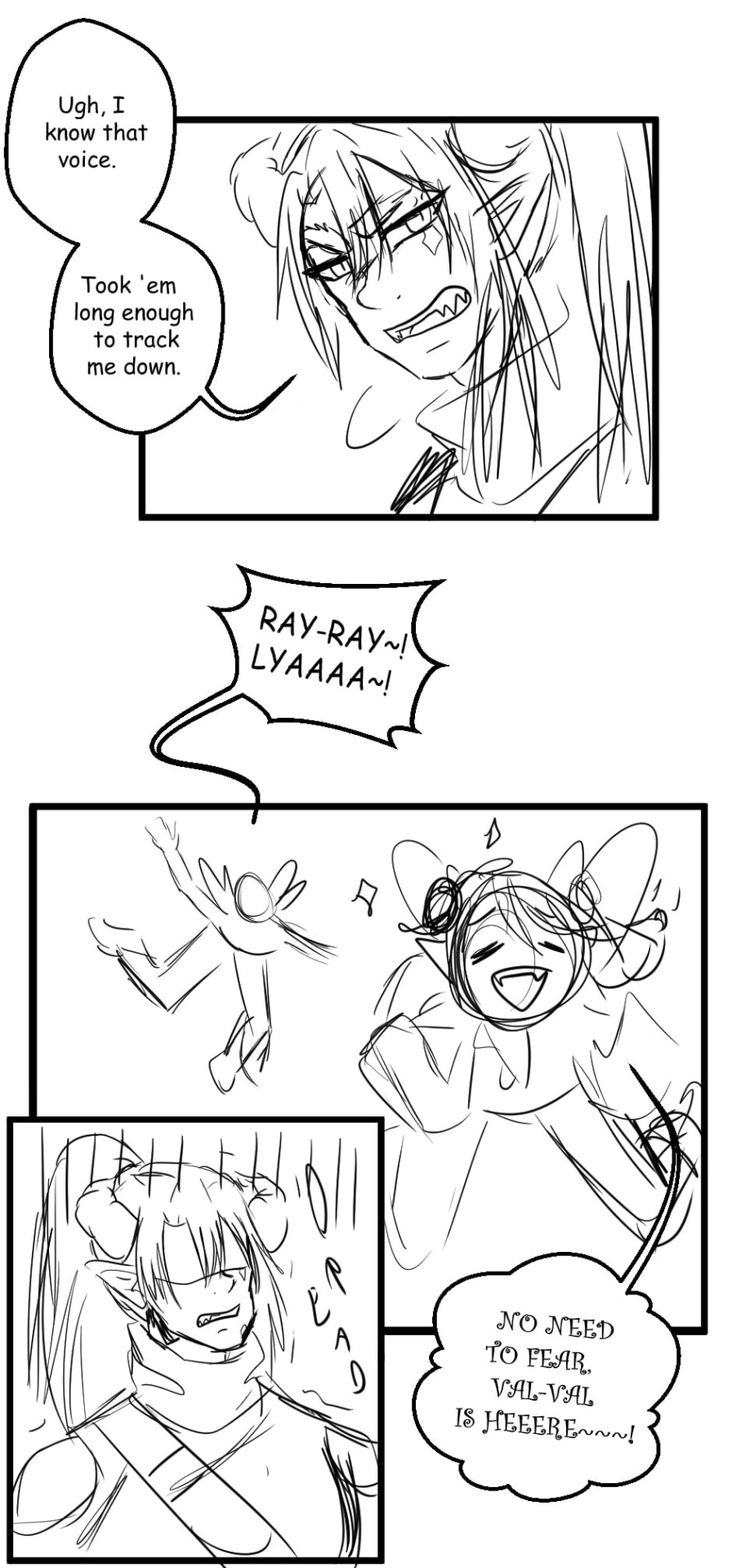
Rupert senses the oncoming hug. 👀
Anyways, RUPERT MY MAAAAANS I MISSED YOU SO MUCH I’M SORRY. 😭😭😭😭
I got so burnt out working on this. Being a one woman army is ROUGH. I also have the next chapter of Blue Jay outlined, but I missed my boy Rupert so much. I wanted to draw him so bad. So I’m starting the rough draft. This is literally page one, lol.
#webtoon#webcomic#the red kingdom: scarlet pages#Rupert raymal duprees#Fae Valerian#wip#the depresso expresso is trying to hit hard again. RUDE#clearly Rupert is the solution
5 notes
·
View notes
Text
How this singular Gold and Gears occurrence might change everything we know about Dr. Ratio
…He might be thousands of years old, oh boy.
Ok, where to begin? Well probably with the occurrence that started it all:
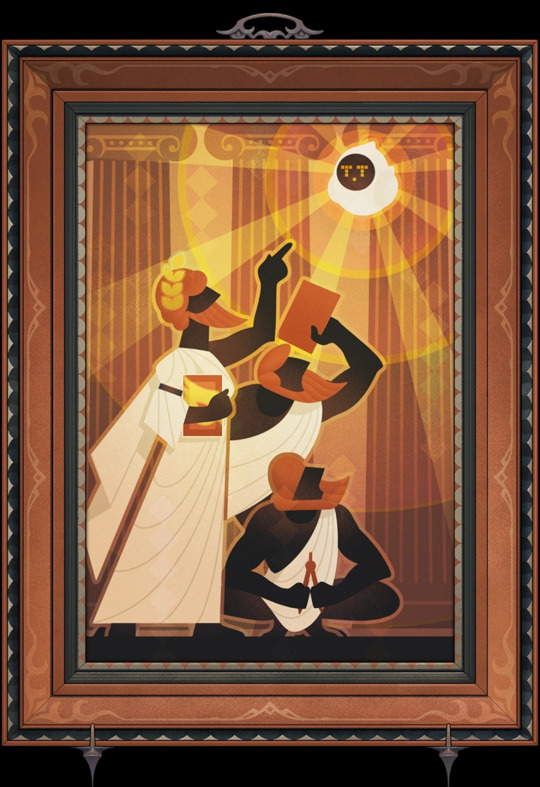
Mechanical City, “Cogito Hair Salon”- Intellgencia Guild
This is where things get complicated.
You see, the Mechanical City is old as hell
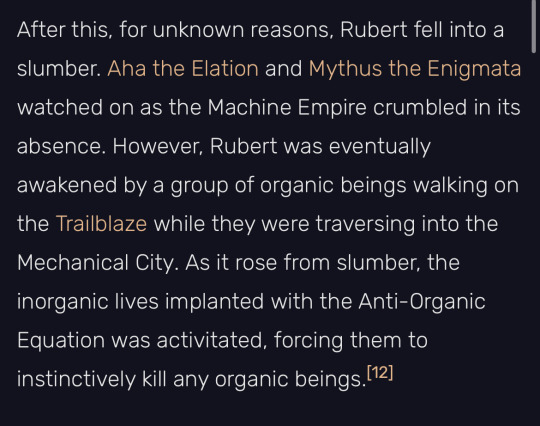
This took place around the time of the First Mechanical Emperor’s war, who created the machine empire, which included the Mechanical City, something which occurred soon after the Borderstar Trade War.
Then, the Rupert 1 (the leader of this empire) sleeps, and this caused his empire to crumble, presumably the city alongside it:
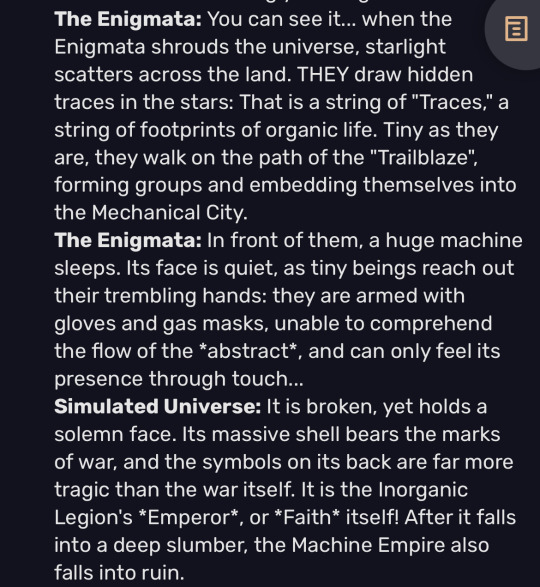
Which according to these Xianzhou records, happened at this time
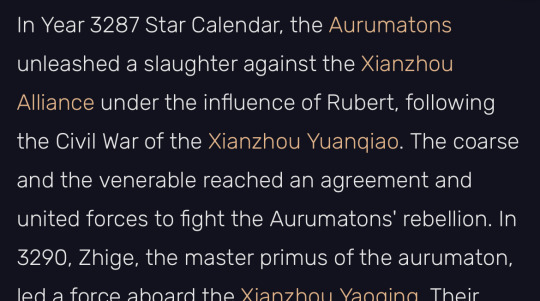

Then Polka Kakamond fought Rubert for a few more Amber Eras until she eventually succeeded in killing him, marking the end of the First Mechanical War.
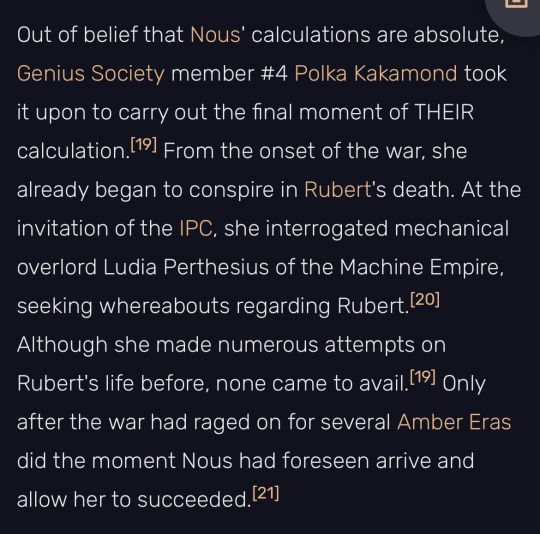
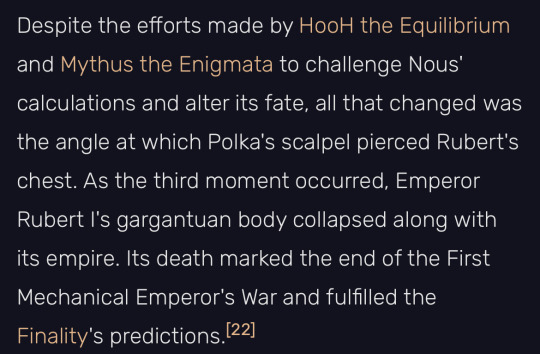
Which resulted in the collapse of its empire, and presumably, the Mechanical City alongside it, Nanook, the youngest aeon, also ascended during this time due to the mess of the Emperor’s War and the remnants of the swarm.
Now, for the sake of my sanity, and this first scenario, I am going to assume that the Mechanical City fell alongside Rubert I when their empire collapsed about years ago, as although it’s likely Rubert II could have revived it, as you will see, it’s not necessarily relevant to this discussion (there are actually only two possible paths this situation could lead to).
If Amber Eras are on average this long
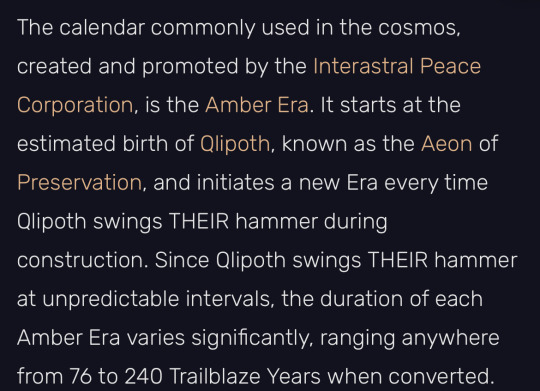
And the current year we are in is

Which is about this in Xianzhou years

Meaning that disaster in the Xianzhou happened around 3500 years ago (if Xianzhou years are the same length as Trailblaze ones, if they aren’t I’m not gonna think about that <3). Then, Polka Kakamond was alive around this time, and it took her several Amber Eras to finally kill Rubert, which I’m going to interpret several as ~5 and the length of these Amber Eras to be averaged out to be around 158 years long each, meaning Rubert died about 2700 years ago, give or take A LOT OF TIME because of the inconsistency of Amber Era lengths, the amount of Amber Eras, the fact that we don’t know when exactly Polka Kakamond decided to start trying to kill Rubert, or even when she was alive, etc.
SO, when you put it all together Dr. Ratio must be at least 1000 years old if he were to be able to be alive during this period of time to attend the Mechanical City within this occurrence.
Which changes everything, because presumably Dr. Ratio is a normal human and he should not be that old.
Oh dear.
However, before I ponder the implications of THAT, let’s explore the other possibilities.
This never actually happened.
This is by far both the most boring and most likely one for a lot of reasons.
a) There is an occurrence that definitely takes place in the preset exactly like it
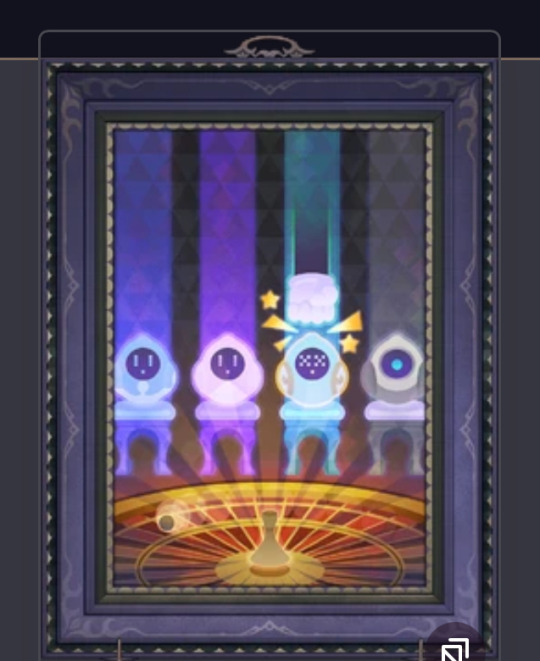
This is Mechanical City, Cogito Hair Salon: Genius Society

And based on its description, it was clearly put in here to help the trailblazer navigate the Simulated Universe through the Intra-Cognition function, and the 4 Genius Society members depicted (Ruan Mei, Herta, Stephen Lloyd and Screwllum) absolutely did not travel back in time for this to happen, rather they seem to habe implemented it themselves.
Therefore, the occurrence with Dr. Ratio could be something similar: an event made up for the sake of navigating the Sim Uni, and not something that ever actually took place, I believe this and another solution I will introduce later are the most likely explanations for this situation.
b) The occurrence with Dr. Ratio is uh, weird
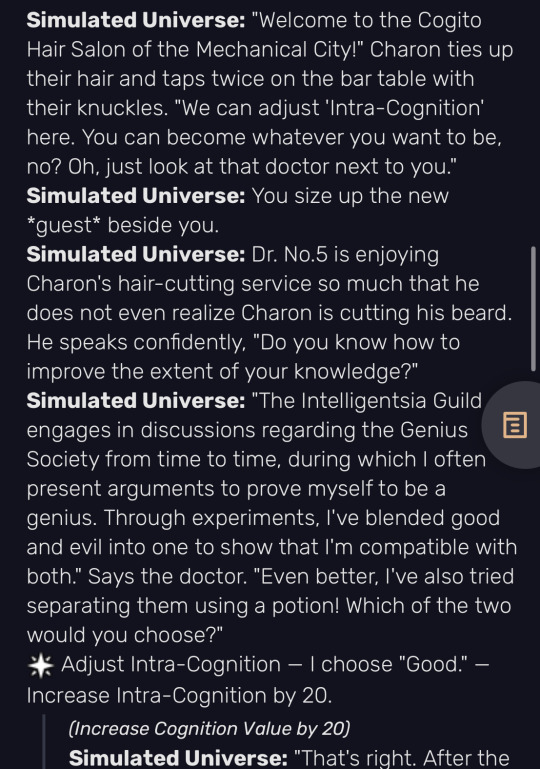
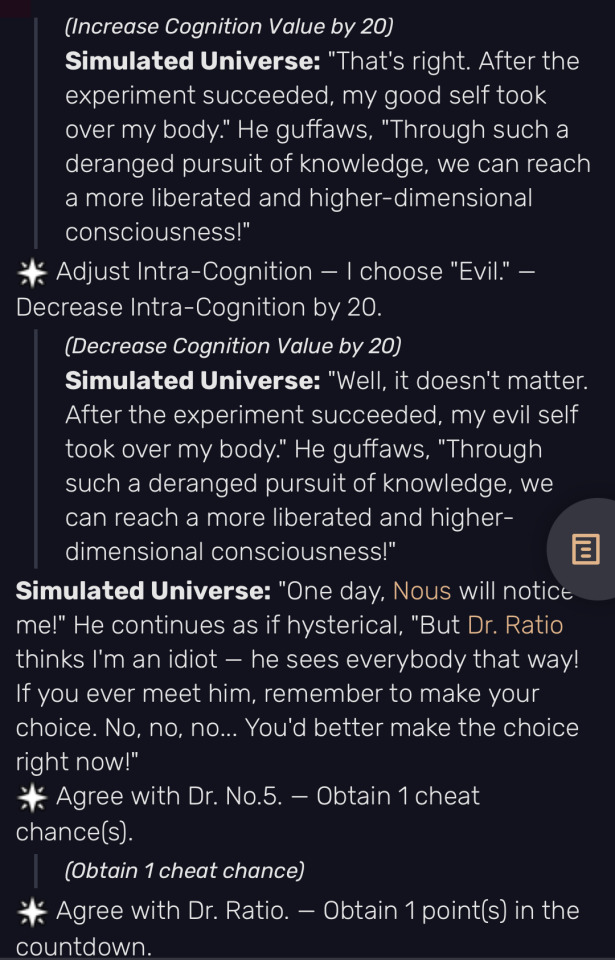
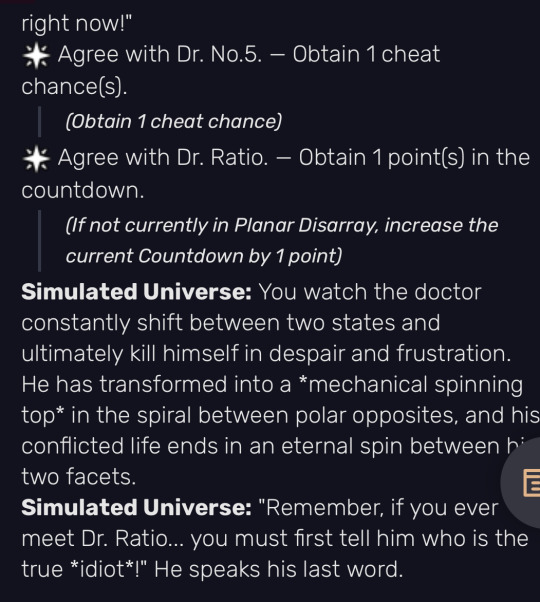
For lack of a better explanation in this, Dr. No5 is uh, tweaking. Meaning, the events taking place around him might not even be what’s happening in reality.
Or, the Trailblazer is in the Mechanical City, but Dr. No5 isn’t and the sim uni kinda just meshed the two together.
What also complicates things is that it seems like after he killed himself, No5 turned into a mechanical spinning top, meaning the Anti-Organic equation might have been the cause of his death? And I’m not sure if it’s still active in modern times.
Either way, the sheer levels of delusion radiating off of Dr. No5 leave to believe this scene isn’t entirely real, however I don’t think this explanation is all good honestly, it’s just something I wished to point out before moving on.
That’s not our Dr. Ratio
Apparently in the original Chinese, the characters used to denote Dr. Ratio are different to the way he is typically referred to, meaning that whoever this Dr. Ratio is, it might not actually BE him.
Now, I know absolutely nothing about how Chinese works, but based off the discussions I’ve seen around this particular detail, I think the general consensus is that the Ratio in this is more of a surname, and our Dr. Ratio either named himself after/is a descendant of this one.
Which would be interesting, and would mean we (I) would now have to scour future updates for his mention, but for now I’ll leave this option at that because like I said, I don’t know how any dialect of Chinese works at all, much less the original used in the game.
If someone reading this does, I would really appreciate clarification/confirmation/your opinion on this, so thanks in advance.
Finally, for my favorite explanation (and the one I think is what really happened), that being:
The Mechanical City still exists, and Ratio is in fact, some dude with a normal lifespan.
Let me cook.
So, based on what I showed you earlier, it’s heavily implied that the Mechanical City fell with Rubert during the First Emperor’s War around 2000 ish years ago alongside him.
However, what if I told you that isn’t necessarily true:
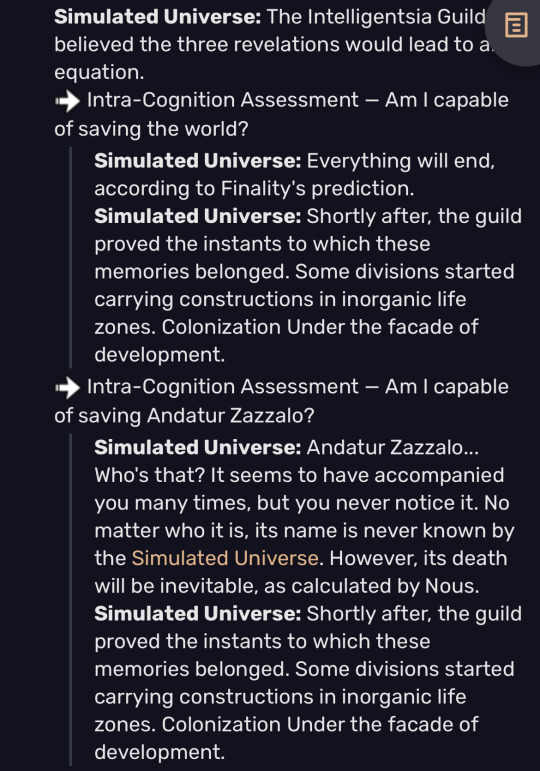
The IPC took it over.
Although this passage doesn’t mention the Mechanical City or even allude to it, it does mention thin how the IPC, with the aid of the Intellgencia Guild, began taking over areas across the universe, especially areas of inorganic life, following Nous’s prophecy, with the methodology of “Colonization Under the facade of development,” (the game straight up calls them colonizers LMAOOO).
Anyways, the IPC HATES inorganic life due to the Emperor’s Wars, and were about to pass an order to eradicate all inorganic life when Screwllum gained Nous’ approval and joined the Genius Society, and as we saw in the screenshot, they were, well, colonizing those areas and making it into their own.
So- who’s to say they didn’t do it to the Mechanical City? Why wouldn’t one of the most defining features of the Mechanical Empire now be under IPC control, even to this day?
Besides, inorganic life forms have no need for hair salons- they don’t have growing hair! But in a Mechanical City repurposed for people, yeah, a hair salon would make sense.
Thereofore, Ratio isn’t some thousand year old entity, rather he’s just in a location run by the IPC and Intellgencia Guild that happens to have thousands of years of history behind it.
Moreover, it just wouldn’t make sense for Ratio to be that old.
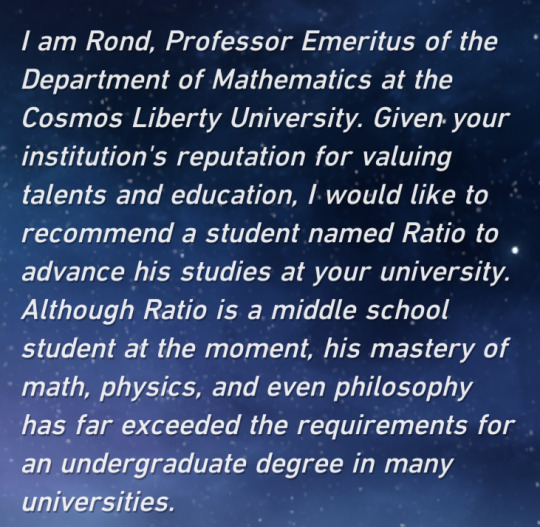
He has plenty of media about him documenting his life, and based on how recent those media are and how this passage is worded, I’m led to believe that Ratio aged like a normal person, and his middle school years didn’t somehow last an exponential amount of time.
Also, I feel like if he WAS that old we would have some actual clue pointing to it beyond a singular occurrence that would only ever point to that once you do all this digging.
Therefore, I conclude Ratio is not in fact immortal, and the IPC likely just colonized the Mechanical City, which is why it is still around today.
Finally, I sincerely hope you enjoy me going insane over this one stupid occurrence, and I would like to disclaim that I am no lore expert when it comes to the simulated universe, so if something I said in here was misinformation, please tell me! It seems as though Dr. Ratio is never beating the “just some guy” allegations lmao.
#honkai star rail#hsr#dr ratio#dr ratio hsr#dr ratio honkai star rail#I need some hardcore lore enthusiasts to fact check this though#I did my best to scour the wiki 😭#I wonder if we will see the Mechanical City though#Maybe when Screwllum releases?#We’ll probably get more lore for it then in his character stories maybe?#Also this helped me learn a lot about Gold and Gears lore#I should probably look over Swarm Disaster then
87 notes
·
View notes
Text
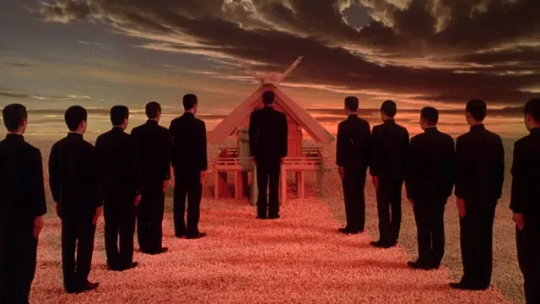
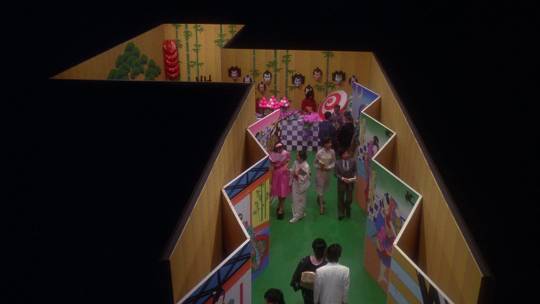
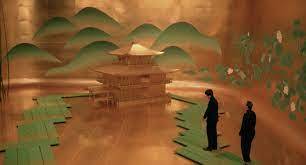

Yukio Mishima has been trending this week for uh, reasons. He was a world renowned Japanese author and all of his work is overshadowed by his actions on November 25, 1970. You might not want to read more about this guy because he is horrible and disgusting, but he's utterly fascinating and the movie about him is brilliant.
He's a really interesting character, to the point that he sounds fictional. He's gay, obsessed with ritualistic death, a right wing lunatic, led a private militia that was halfway to a cult, and also was a legitimately great author. His life is covered in the film Mishima: A Life in Four Chapters and it's easily the most beautiful film I've seen in my life. Look at the stills I posted above; every frame of this movie looks like that. It's all just a series of beautiful paintings with people living in them.
The way the film is structured is that it tells the story of his life in three ways. His past is told in black and white flashbacks with static cameras. This is closer to how a movie from the 50's would look like (specifically ones directed by Yasujirō Ozu). The events of three of his books are told with this beautifully stylized look, with sets that look like stage plays. The events of November 25, 1970 is told in an almost normal fashion, with regular colors and competent camerawork. The past is nostalgic, the present is mundane and only in fantasy can you truly come alive.
Through this movie we see the ideology of Mishima coming through. His nationalism, his sexual feelings and his thoughts on beauty and death all come together. Death isn't just a violent and tragic end, it is in itself a beautiful act. Beauty is the only true goal of life and creating beauty brings honor. Growing old and ugly is an act of hate; to die at your peak is to give love back to the world. It is therefore treasonous to live long enough to die peacefully. He pities what heaven must look like now; when men died young and beautiful it was paradise, but now it is filled with old men.
This is an objectively insane way to view the world but it is also fascinating. How much of this was what he believed, and how much of it was just begging for attention? In one instance when asked why he moved to the right politically he said "because the left was full". It was a joke answer, but he clearly wanted to be in the spotlight. His shield society was a paramilitary group dedicated to living a virtuous life of beauty, honor and old ideals. It was also a group of good looking, athletic young men led by a (barely) closeted, conservative gay man. So much of his life could have gone differently but also he was pretty much in control the whole time; he was independently wealthy and revered on the world stage. He could do whatever he wanted, and apparently the way his life went *is* what he wanted.
What's special about Mishima, both in the film and in real life, is that he's a smart and eloquent guy. In films the guy with a crazy worldview is someone like Travis Bickle from Taxi Driver or D-Fens from Falling Down. Travis couldn't understand the alienation and loneliness he felt and he couldn't find any healthy solutions. D-Fens was smart enough but not emotionally strong enough to confront his problems or deal with them maturely. These are people that could benefit greatly from therapy (other examples include Joker from Joker, Rupert Pupkin from the King of Comedy, Frank Murdoch from God Bless America, Patrick Bateman from American Psycho, Tyler Durden from Fight Club and so, so many more).
These are either 20 something year olds that are lost in the world, alienated and lonely, or 40 something year olds with a mid life crisis when they realize that everything has fallen apart. People who don't know where to go, or realize it's too late to change things. Travis Bickle had basically no friends, no family, no charisma with women and a lot of rage and anger. D-Fens lost his job, his self respect and was estranged from his ex-wife and daughter. These are people who's lives are shit at best (Patrick Bateman is a bit of a subversion. He is rich and successful, but his life is completely hollow, his relationships are shallow and he personally is very, very pathetic. I need to write about American Psycho later that film is great too.).
Mishima is different. He's smart enough to understand his issues and how to find help. He's got the money and means to do so. He's famous and rich enough that he could basically get away with anything weird or eccentric so long as it was harmless. On the world stage he was a popular author, and at home he led a life of political activism. If he was unhappy he could easily find healthy ways to fix it. His self destruction was the most avoidable of any of them, yet he's the only one that existed in real life. You expect these people to have serious personality flaws and unfixable (or seemingly unfixable) problems, not to be poetic writers that adhere to healthy living and regularly journal about their emotions, while enjoying respect from their peers and fulfillment in their work.
It's a hell of a film. Paul Schrader has not written or directed anything better (he actually wrote Taxi Driver too, so he had some experience with this type of character before) and it stands out as an incredible experience to watch. Like, Mishima's life is public knowledge and you can probably guess how it went, but I've purposefully not said what happened on November 25, 1970 because I don't want to spoil it. It's an event that actually happened but it's better for you to find out via the film than some wikipedia page.
#film#movie#cinema#paul schrader#yukio mishima#mishima: a life in four chapters#taxi driver#martin scorsese#patrick bateman#american psycho#travis bickle#rupert pupkin#the king of comedy#joker#joker (2019)#god bless america#Frank Murdoch#D-Fens#falling down#fight club#tyler durden#Yasujirō Ozu#japanese film#lgbtqia#lgbtq community#lgbtq
149 notes
·
View notes
Text
exactly and what you said in your prev post that
“Though, right now I'd be more in favour of Jamie x Roy, anyway, since Keeley finally should get some time to sort herself out as an independent woman and to do some reflection and self exploration, instead of jumping straight into the next relationship. And Jamie and Roy can give her the support and encouragement she needs as her platonic besties.” x
feels like they had all this potential & intentional writing leading to this solution but decided they don’t actually care that deeply about these characters and what’s best for their personal growth/happiness & would rather pretend all their problems are resolved when they’re offscreen so yay let’s get that favourite het couple back together now that we’ve made the queers happy putting keeley in that toxic lesbian relationship with her boss that was def not reflective of rebecca & rupert at all so you will forget all the issues with roy x keeley that should seem minimal in comparison! regardless of the fact that they were both holding each other back at the end of their relationship.
also it feels so unfair to jamie. like, not that keeley should be viewed as a reward in any way, - tbh feels like the show is portraying her like that tho - i agree she needs time to herself for a while and is not a saint. it seems like roy just had such minimal growth — still important, but not enough to be ready to get back together with keeley again. like, he apologised to jamie for projecting his anger (just in that one instance tho). he did the press interview after rebecca yelled at him. and then he claimed responsibility for his part in him & keeley’s relationship not working (apparently entirely his fault?? no one told him otherwise which also seems unfair) and suddenly everything’s fixed.
what about all of jamie’s growth?? that keeley even acknowledged in the start of the season? he has basically zero issues aside from a lifetime of unprocessed trauma. he has a major crush on his coach who has volunteered hours of his free time - on top of seeing each other at work every day - to “train” him during which him & jamie have opened up to each other and clearly benefit from spending time together. they could thrive in a romantic relationship.
as i have written before, jamie would continue to be a gentle & patient support system for roy. help him address his anger & suppressed emotions & they could learn to deal w the hyper masculine & homophobic football culture together. roy can motivate jamie like no one else. he has gained jamie’s trust and would encourage him to open up about his traumas and roy would recognise how his anger has affected/triggered jamie in the past. they’d probably both have sessions with dr. sharon.
plus then they’d be that professional but obvious couple who are both very career focused but also probably fuck in roy’s office after practice/matches (or the boot room to will’s horror…but he knows by now to just leave when he sees them come in after that one time..) imagine how many problems them just having sex would solve. i mean, honestly.
roy/keeley said they were too busy for each other but that wouldn’t be a problem for roy/jamie since it’s literally their jobs to spend time together. roy can spend time by himself, with keeley, his yoga mums group, phoebe, the diamond dogs. jamie can hangout with colin & isaac, sam, dani, keeley, phoebe, be by himself, etc.
i just think this would solve a lot of everyone’s issues idk. too bad i don’t write the show lol
"Jesus, can you imagine if you fell for it, and you got back with Rupert? After all that floppy cock has done, you'd have to be insane. You would have to be at the bottom of your emotional barrel to do something that dumb, right."
Words of wisdom that don't apply when the floppy cock is Roy (not that Roy is as bad as Rupert, but he hurt Keeley a fucking lot), because in that case it has to be celebrated and people rejoice over the perfect couple getting back together.
Or will it actually turn out that it was dumb and insane for Keeley to throw herself back into a relationship with Roy, considering she is at the bottom of her emotional barrel right now?
Was this clever, intentional writing or am I—once again—giving the writers too much credit and the message in the end will be "If a good guy breaks your heart, take him back once he manages to do the bare minimum!"?
And Roy being like "Oh, I was stuck and a mess when I was with Keeley. When I broke up with her, I probably caused some damage, that I need to fix. And since I'm not stuck anymore and lighter now I should totally get back into the relationship where I felt stuck and was a mess!"
Yeah, a lot of their relationship problems were caused by Roy's insecurities and stuckness, and that was the reason he pulled away, but that wasn't all that was going wrong between them. There were still Keeley's abandonment issues and her inability to tell him stuff that might upset him out of fear of rejection.
So it would have been good to actually talk things out to see, whether it really was all him. (And honestly, both Roy and Jamie tend to put Keeley on this pedestal as if she is flawless and perfect and that might be nice for Keeley's ego, but it also doesn't give here the freedom to fuck up and be imperfect, which can be a lot of pressure.)
(I'm still so salty about it and if that was all there was to their reconciliation and they're endgame just like that, I'll be pissed. After having them apart and barely interacting the whole season, this would be way too rushed and just bad writing.)
#long post to add to the long post#cheers if you read that#jamie tartt#roy kent#roy x jamie#keeley jones#roy x keeley x jamie#ted lasso
38 notes
·
View notes
Text
also also. a lot of people are coming at Shandy for being clueless and bad at her job (true) but ignoring that (and know that I say this with DEEP love & affection for her, truly) Keeley is also... kind of clueless and bad at her job?
I don't mean bad at every aspect, obviously she's great at running PR and she proved that by a tenfold during her time at Richmond. But she is categorically not being a great boss right now. She's certainly trying really hard, but she's overcompensating and flailing and the result is that everything is not going well.
Rebecca had to tell her what a CFO is, which means she doesn't understand (i.e., hasn't taken the time to understand) the roles of her employees; She literally did not know her boss'/financier's name or that she was a woman? What? She was more concerned that Jack see her as mysterious and interesting than you know, competent and a good employee. And yes, she hired Shandy without consulting anyone, but then she's not given Shandy the supervision and guidance she clearly needs. Why was Shandy thrown into that whole Bantr campaign all by herself? (And Shandy, by the way is also not bad at every aspect of her job. She was doing well at running the shoot. Presumably she got Zava to hype up Richmond a bit on his socials. She heard 'Bantr needs more subscribers' and ran with it, but she didn't understand the assignment when it backfired on her and it is kind of coming across as...Keeley didn't totally explain it to her?)
And again this is NOT a diss at Keeley or me trying to totally alleviate Shandy of blame for her very large and questionable fuckups. I think the idea is...they are both floundering because they are both lacking the belief and support of the people around them. Keeley, I think, is very paralyzed by imposter syndrome and feeling so out of her depth that she's just... given up on some aspects of her job. Obviously her coworkers dismissed her off the bat because of how she presents herself and how they equate that to her not being professional enough or smart enough etc. This is completely awful, but it does not negate the fact that just as they don't understand her, she doesn't understand them? And she hasn't been shown to make any real attempt at connecting with them in a meaningful way.
At Richmond, she had Rebecca's support every step of the way. Now, she is isolated. Not only at work, but also in her personal life. Her only friends are both coworkers (Rebecca & Shandy) and then there's her breakup with Roy, which she hasn't had time to fully process or come to terms with because of the job.
The theme seems to mimic what's going on at Richmond right now: we can't be our greatest selves on our own. We've got Roy isolating himself as a bad solution to his problems, Ted's once resounding belief in his team giving way to like, complete and total apathy, the team misplacing their belief entirely in Zava alone, Nate's mental health plummeting now that his only "support" is Rupert. And they're going to flounder like Keeley is floundering. Like Shandy is floundering and will continue to flounder as even Keeley's faith in her wains.
We need the people around us. We need their belief. In the end, coming together is obviously what's going to save the team, but I do think the same thing will happen for Keeley at her workplace. Things are definitely going to get worse with Shandy in the interim, but I hope in the end she is able to prove that Keeley's initial belief in her was not unfounded. Just as Keeley will start to build a new support system, with (hopefully) Jack, and reconnecting with Jamie and presumably Roy, and regain the belief in herself that allows her to believe and uplift the people around her, too.
#keeley jones#ted lasso spoilers#ted lasso#my man jamie is the only one believing this season. smh!!!#in all seriousness#I don't think keeley is doing very well mentally right now and it's absolutely reflecting in her work.#also. I'm annoyed at how this fandom treats the female characters they don't care about...Sassy & Michelle & now Shandy#even though these characters are no more or less flawed than any other 'more important' character on the show
98 notes
·
View notes
Text
Theories regarding Emma, the Diary, and the Ghostie
A. EMMA AND THE DIARY
Here are the facts:
the last entry we read from Tatiana's diary was about the night she met Rupert*
before that, Emma was able to talk about the diary (she brought it up in her letter to dru)
since then, we have heard nothing of the contents of the diary, nor has she been able to talk about it even still
Emma only started acting weird after that entry. (the extent of the weirdness I went into detail about here regarding this post)
Add to all of this:
Emma seemed to have returned to herself in this entry
by the time the ghost mentions the diary, Emma seems to have already finished it
Julian himself noted that Emma was acting "un-Emma" but only when it came down to discussing the diary
There is plenty of evidence that somehow, in some way, Tatiana is controlling Emma, influencing her not only to keep the contents and existence of the diary to herself, but also to act in certain ways that feel more like Tatiana herself. But the question is WHY. Why would Tatiana hide the things in her diary? Why did she feel the need to specifically hide the pages after the day she met Rupert (as the evidence suggests)?
B. THE GHOSTIE
Theories about the ghost's identity have been nothing less than rampant, but for me, all of the clues can only point toward Rupert Blackthorn (*This could stand by itself on the fact that we stopped being privy to the contents of Tatiana's diary entries the MOMENT he was introduced, but I will go further):
Ghostie reacted violently to the Blackthorn name
the ouija board shattered into 16 pieces which just happens to be the number of letters in the name "Rupert Blackthorn"
Ghostie was shuffling through old files Emma called the "Blackthorn archives"
the ghost would not be a character who's identity would spoil Chain of Thorns in any way
Rupert died at Blackthorn Hall
But what does Rupert have to do with the Devil Tavern? Why would a silver band be important to him? Why does he want Emma and Jules to read Tatiana's diary?
C. RUPERT AND TATIANA
Everyone was confused about why Rupert fell in love with Tatiana--I remember people joking about him losing a bet--but I think the answer is simple: magic. Maybe Rupert was attracted to her at first, maybe once he started seeing how obsessive Tatiana can be, he started to back off a little. Whatever happened or didn't happen, I think Tatiana would easily feel threatened by the possibility of Rupert leaving her. She was desperate for a husband to escape from her father's house where she was treated like something stuck to the bottom of Benedick's shoe, and I'm sure she was asking the same questions about how Rupert could possibly love her.
Knowing the lengths Tatiana is willing to go to, knowing that there were demons lurking around her house on the regular, I would not be surprised if she found herself conniving a way to ensure Rupert's eternal loyalty.
We know Tatiana has used a silver bracelet to enact her wishes before and that it worked the way she needed it to. Without having the power to control men with her own will (a power she later has Belial bestow upon Grace, which shows that this is clearly something she has been thinking about for a long time), she has to find another way to do so. Enter: the silver band.
When Grace came to Tatiana confused about why James wasn't able to be controlled, Tatiana had a solution. I am willing to bet that this is because the Gracelet was originally Tatiana's, before she ever had it engraved with the little Cartright touches. I am willing to bet that Tatiana pulled this out of her jewelry box in a desperate search for something to tie loyalty magic to once she learned that it was possible.
I see it like this:
Tatiana gave the charmed bracelet to Rupert
Rupert was killed, still wearing the bracelet
Rupert was therefore still tied to Tatiana after death, and therefore tied to what soon became Blackthorn Hall
Tatiana had a spell put on him so that he could never share his identity or his predicament with anyone
Tatiana had a spell put on her diary so no one could find out what she had done to get what she wanted, which is now affecting Emma
D. CONCLUSION
I find it very likely that once James took off the Gracelet, he wanted to get it away from him, but its also something I have no doubt the Merry Thieves would want to study first. In this theory, they brought it to the room above the tavern, where it was left behind once the room was abandoned (which I have another theory about regarding the end of Chain of Thorns). THIS is why Ghostie (aka Rupert) wanted Jules and Emma to go to Devil Tavern.
I'm sure there are some things missing from this, but I assure you I have answers that comply with this theory for most of them. I'm curious about what other people think, if this is something that has been washing around in your head too?
(also would love for @cassandraclare to see how insane she has made me lol)
112 notes
·
View notes
Text
The Scooby’s Auxiliary Fight Club (& Support Group)
by My_Barbaric_Yawp
The first rule of fight club is no talking about fight club, right?
The second rule is no, really, no talking—Vegas rules, yeah? What happens in fight club stays in bloody fight club. No spilling the beans to your chatty little girlfriends.
(That means you, Harris.)
The third rule of fight club is definitely don't tell the Slayer. She'd never let him live it down.
***
When Oz decides running away from his problems isn't the solution, he turns to the one person in town who seems to have a handle on his demon: Spike.
In which Oz and Spike save the Scoobies, get the girl, and change the future through the power of friendship, anger management, and…healthy communication?
AU post 4x09 - Something Blue. EF April Challenge Month 2023 Response to Ethereal Demon's If Oz Had Stayed Challenge.
Words: 3232, Chapters: 1/?, Language: English
Series: Part 5 of Yawp's Spuffy Fics
Fandoms: Buffy the Vampire Slayer (TV)
Rating: Mature
Warnings: No Archive Warnings Apply
Categories: F/M
Characters: Spike (BtVS), Buffy Summers, Daniel "Oz" Osbourne, Willow Rosenberg, Tara Maclay, Xander Harris, Anya Jenkins, Rupert Giles
Relationships: Spike/Buffy Summers, Daniel "Oz" Osbourne/Willow Rosenberg, Tara Maclay/Willow Rosenberg, Tara Maclay/Daniel "Oz" Osbourne/Willow Rosenberg, Xander Harris/Anya Jenkins
Additional Tags: What if saying the hard thing out loud made everything a little bit better - a story, Gratuitous and unexpected Star Wars tie ins, men having feelings, women having feelings, Everyone having feelings together at the same time, who said therapy had to be dull? Not Spike, The author clearly remembers more about Star Wars than Fight Club, whoops, Slow Burn
source https://archiveofourown.org/works/46544974
3 notes
·
View notes
Text
So I watched Ted Lasso 2.06
And I want to put down my predictions somewhere so that if I turn out to be right, I can be an unremitting dickhead about how I was right neener neener.
I think Sam and Rebecca are going to have an actual relationship. I think there are profound problems in terms of the owner dating a player, and that they'll figure out a solution to that. I do not think the age gap (which is exponentially less than the age gap between, say, Rupert and Bex) will ever be seriously addressed because it's not a serious problem. I don't have any predictions as to whether it will be endgame, but they clearly have a pretty romantic connection already, so it wouldn't make sense not to explore that.
I think (and this is 100% just me HOPING, obviously) that Ted's going to turn out to be messaging with Trent. I don't have anything to base that on other than that I ship it and it would be great.
I think they're going to lose the FA cup.
I think they're going to get promoted, probably via the playoffs.
I think Nate's going to either leave the team and go elsewhere to coach, or get actively headhunted by another team and leave with an offer. I think he'll be out for the rest of the season and into the third, but will reconcile with Ted and the other coaches sometime in Season 3.
I think Season 2 is going to end with Ted having to decide if he'll stay in the UK or go home and be with his son. I don't have any idea what he'll pick - yes I know they have a third season to shoot, but I think the chances are good that the season ends with him getting on a plane back to Kansas.
ETA: I think there's a very very outside chance that Beard and Ted get together, based solely on Keeley's offhand remark about how Jane once followed her home to ask if Beard and Ted were sleeping together. JUST SAYING. PUTTING IT OUT THERE INTO THE UNIVERSE.
64 notes
·
View notes
Link
Rightwingers and Fox News are blaming renewable energy for power outages when the exact opposite is true. It’s creaky old fossil fuel generators which are failing in far greater numbers in Texas.
While some wind turbines did freeze, failures in natural gas, coal and nuclear energy systems were responsible for nearly twice as many outages as renewables, the Electric Reliability Council of Texas (Ercot), which operates the state’s power grid, said in a press conference on Tuesday.
Frozen instruments at gas, coal and even nuclear power stations were among the main problems, Ercot director Dan Woodfin said, according to Bloomberg.
Blatant lies are being spread in an effort to try to damage competitors to the politically powerful carbon-based energy industry in Texas and nearby states. (emphasis added)
[A] variety of misleading claims spread on social media about renewable energy, with wind turbines and the Green New Deal on the receiving end of much of the attention.
A viral photo of a helicopter de-icing a wind turbine was shared with claims it showed a “chemical” solution being applied to one of the massive wind generators in Texas. But the photo was taken in Sweden years ago, not in the US.
Other social media users, including Republican congresswoman Lauren Boebert of Colorado, labelled the Green New Deal as the culprit. Boebert tweeted on Monday that the proposal was “proven unsustainable as renewables are clearly unreliable”.
Rep. Lauren Boebert (R-CO-03) is a crackpot follower of QAnon. She’s basically Marjorie Taylor Greene on decaf.
Speaking of fossils, media owned by 89-year old Rupert Murdoch have been complicit in spreading lies to prop up fossil fuel companies.
Fox News also joined in with one of its presenters, Tucker Carlson, claiming that renewables were to blame and that Texas was “totally reliant on windfarms”. The Wall Street Journal said in an editorial that “the power grid is becoming less reliable due to growing reliance on wind and solar, which can’t provide power 24 hours a day, seven days a week”.
Seriously, doesn’t Murdoch have anything better to do this year than to try to aggravate climate change and destroy democracy in the United States? He should think about how history will view him rather than how much more loot he can make in his twilight years by lying to gullible people.
Climate change can generate extreme weather of all types. The weather in the midsection of the US is caused by the Polar Vortex.
Heating Arctic may be to blame for snowstorms in Texas, scientists argue
A quick explanation of the connection between climate change and the Polar Vortex is provided by the Science & Climate Department of University of California – Davis.
While the polar vortex is well documented, its behavior has become more extreme as a result of climate change, according to Ullrich. He explains: warming of the Earth has led to the loss of Arctic sea ice, transforming a highly reflective icy surface to a dark absorptive surface. The change is warming higher latitudes and reducing the temperature difference between the warmer mid-latitude and polar regions. This weakens and destabilizes the polar jet stream, causing it to dip into lower latitudes, bringing polar air farther south. Ullrich expects future climate change to further weaken the polar jet stream, bringing rise to more extreme and unusual weather patterns.
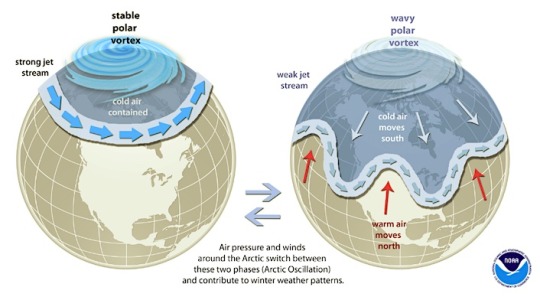
Ignorant politicians in bed with the fossil fuel industry like Sen. James “Snowball Jim” Inhofe (R-OK) point to every snowstorm or cold snap and say “I guess we don’t have global warming! lol” Inhofe would like people to forget that his home state frequently experienced climate related drought conditions over the past decade. In September of 2011 100% of Oklahoma was in a state of Severe Drought including two-thirds of the state which was experiencing Exceptional Drought.

In case you were wondering what is meant by Exceptional Drought...

^^^ Feel free to send those graphics to Sen. Inhofe and add: “I guess we have global warming! lol”
#texas#renewable energy#energy#power outage#fossil fuels#carbon based energy companies#climate deniers#fox news#rupert murdoch#republicans#james inhofe#oklahoma#lauren boebert#environment#polar vortex#climate change
168 notes
·
View notes
Text
How to Find Lestrade - Sherlock Season 3 Episode 2
In case you just want to watch the bits of Sherlock that have Lestrade in them… timings are taken from my Blu-ray player. Previous episodes can be found here:
https://johannadc.tumblr.com/tagged/lestrade-video-timings
Season 3 Episode 2, “The Sign of Three”
Lots of Greg Lestrade in this, the wedding episode, but many are tiny bits, so forgive me being a bit ridiculous with the timings. And interpreting what are often wordless reaction shots. (Great job, Rupert Graves, with the expressions!)
0:00 - 3:52 The show opens with Lestrade getting angry about not being able to get the Waters Gang put away, with scenes from 18 months ago to the present. Three months ago, he's kicking the car tire while Donovan tries to calm him down. A newspaper article reveals that he's a DCI (Detective Chief Inspector).
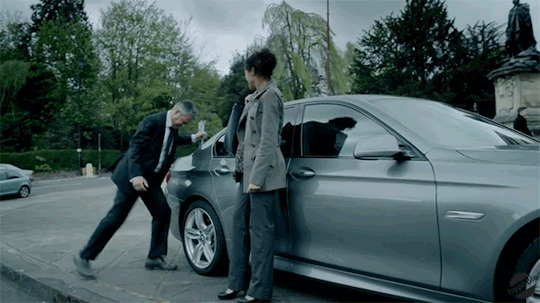
Present day, Sherlock texts for help, even saying "Please", which gets Greg sending "maximum backup" to Baker Street, only to find, in a scene that sets the tone for the rest of the episode, that Sherlock hopes he "didn't go to any trouble." He needed help with his best man speech for John's wedding.
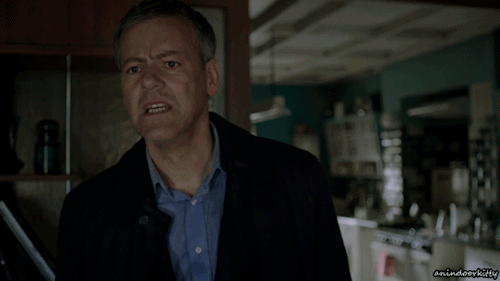
8:54 - 8:56 At the wedding, Greg is standing next to Sherlock and John with Archie (the ringbearer) during the photo shoot montage. (There are probably other places you can spot him during this sequence, but since they would be less than a second, I wasn't that obsessive about it.)
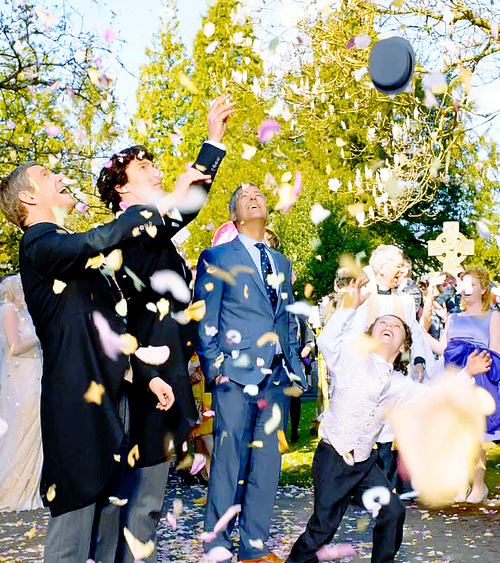
12:46 - 12:48 The photographer snaps Greg drinking alone at one of the banquet tables.
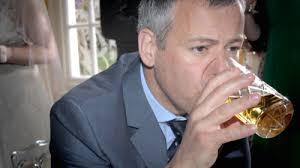
13:41 - 14:16 Greg's head can be seen in the lower left corner in front of John as John spies Major Sholto and Sherlock and Mary discuss John's friend. This is also where we see Greg in glasses.
18:20 - 19:14 Greg, seated between Mrs. Hudson and Molly, is drinking again as Sherlock begins his best man speech. There's a flashback to Molly, in the morgue, expressing her concern to Lestrade while holding a brain. He responds, "What's the worse that could happen?"
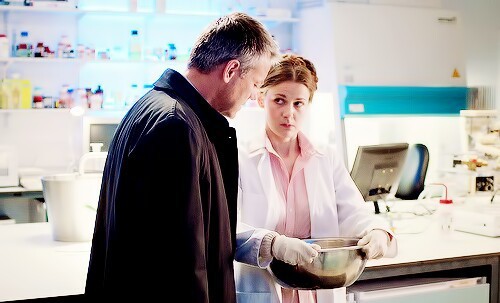
20:33 - 20:35, 21:12 - 21:14 Cut to Greg laughing as Sherlock reads a telegram about "big squishy cuddles", then later covering his mouth as Sherlock introduces John as his friend. (This leads into a flashback to John asking Sherlock to be his best man where Sherlock describes "Gavin" Lestrade as "a man, and good at it.")
24:52 - 24:55 Greg is now almost heads down on the table, hunched over and leaning on his elbows.
25:19 - 25:21 Greg (and most of the guests) can't believe Sherlock is talking about John's wedding and sentimentality as "the doom of our society".
25:44 - 25:46 Sherlock is praising John for being obsessed with him. Greg laughs and drinks again. (I'm seeing a drinking game here.)
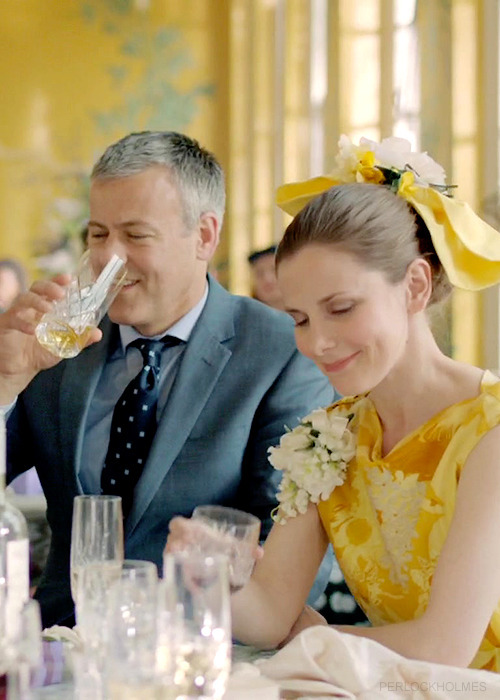
26:39 - 26:43 Greg, concerned, and Molly share a look as Sherlock talks about how he never expected to be anyone's best friend.
27:45 - 27:46 The audience is crying as Sherlock praises John. Greg looks stoic.
27:55 - 27:57, 28:00 - 28:03 Wider shot. Greg has his arms crossed, then in the return shot, straightens his tie and looks away as Sherlock wants to know "what's wrong, what happened, why are you all doing that?"
28:16 - 28:18 Greg and the guests applaud.
28:32 - 28:34 Greg chuckles as Sherlock asks everyone to cheer up a bit.
42:53 - 42:55 Sherlock has just presented the case of the Bloody Guardsman to the guests. Greg looks befuddled in a wide shot of the audience.
43:15 - 44:18 Sherlock calls out "Scotland Yard" for a theory. Greg does not distinguish himself with an idea about a dwarf, an air vent, and a catapult. He then listens to Tom's idea of a "meat dagger".
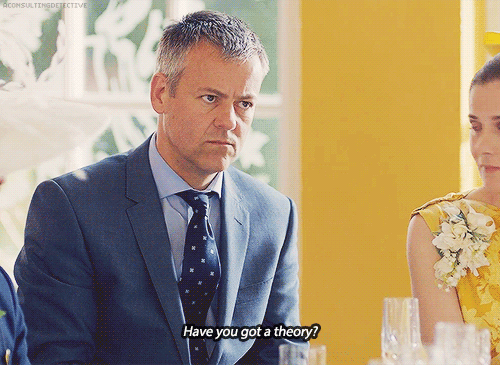
44:45 - 44:47 Greg, arms crossed, chuckles at Sherlock insulting John's ability to plan a wedding.
45:00 - 45:14 Greg asks Sherlock for the solution. Sherlock admits he doesn't know.
56:08 - 56:31 Greg wakes them up in a cell after the stag night. He yells at John and watches Sherlock look like a gangly foal.
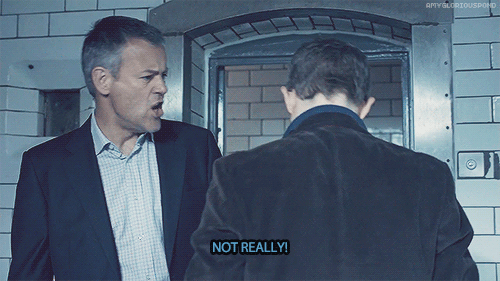
1:05:10 - 1:05:12 Bemused Greg listens to Sherlock talk about how boring domesticity is.
1:05:29 - 1:05:34 Greg looks concerned and a bit angry as Sherlock says his ability to read a crime scene makes him special.
1:05:52 - 1:05:56 Greg drinks and smiles as Sherlock talks about "murder, mystery, and mayhem."
1:06:09 - 1:06:12, 1:06:25 - 1:06:26 Everyone rises, glasses in hand, as the photographer walks to the front for the toast and Sherlock freezes.
1:09:23 - 1:09:25 Greg and Mrs. Hudson look at each other as Sherlock figures things out (with help from Mycroft) in his mind theater.
1:09:30 - 1:09:31, 1:09:37 - 1:09:42 Preparing for the toast, Sherlock has them sit down again.
1:09:59 - 1:10:01 Sherlock walks past after leaping over the head table and trying to keep everyone focused on him while he figures out to prevent the murder. Greg's just one of the audience for this.
1:11:36 - 1:11:45, 1:11:50 - 1:11:51 Sherlock texts "Geoff" to "lock this place down" while sending him to the gents. Greg walks past Sherlock on his way out as Sherlock tells John "vatican cameos".
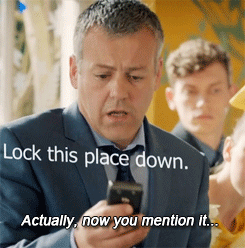
1:21:02 - 1:22:03 Lestrade brings in the photographer, who was "halfway home." (Clearly the lockdown warning didn't work as intended.)
1:22:55 - 1:23:50, 1:24:08 - 1:24:35 The murderer is arrested, although apparently it didn't take long, since as we cut to the first dance, Greg is benevolently watching John and Mary.
1:25:07 - 1:25:10, 1:25:14 - 1:25:16, 1:25:35 - 1:25:38 Greg looks at the floor, then at Sherlock, then closes his eyes as Sherlock makes his vow to always be there for "all three of you."
1:25:42 - 1:25:43, 1:25:47 - 1:25:48 Greg is visible in foreground and background while Sherlock, John, and Mary talk.
When I set out to re-watch this episode, I thought, "oh, I shouldn't have waited so long, this is the comedy one." And then, at the end, I remembered... I think that's the single saddest moment in the show, for me, with Sherlock whirling his coat on and walking out alone after seeing everyone else happy whether he's there or not. And Benedict Cumberbatch's expressions in the scenes just before... so evocative.
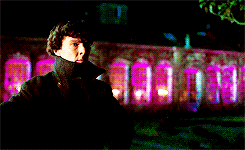
42 notes
·
View notes
Link
so I’ve started playing Contradiction, which I bought last year after PD died. For the uninitiated, it’s the video version of a Puzzle Adventure book, the kind where you must e.g. find the secret entrance before turning to the next page in the story - except in this case cheating is impossible. Oh, and everything - from the interviews, to DI Jenks knocking on a window, to the shots of the village as you walk through - is filmed.
The mechanics are simple: talk to people, then look for contradictions in what they said. If you can catch them on a contradiction (ah-ha!) you can squeeze them for more information and thus progress through the story. Occasionally something unexpected will happen, like when you stumble upon a man boozing up beside the lake because apparently this tiny village has a serious alcohol problem.
It’s currently 7.49€ on Steam (full price is 9.99€) which imo is pretty fair if you have the money to spare. This one is rarely on sale, so don’t expect it to go much lower.
Why you should play this game:
Paul Darrow (takes a while to show up but when he does, he brings it)
John Guilor is also excellent as PD’s equally terrible son
Rupert Booth is clearly enjoying his role as Detective Inspector Jenks. The ham is chewed, spiced and savoured.
delightfully campy in the most self-aware way
hearing Jenks say “ah-ha!” when you spot a contradiction will never, ever get old
Paul Darrow. MAXIMUM SNEER!
not hugely difficult, but requires careful thought - challenging without being frustrating, and gives a genuine feeling of achievement
sarcasm
a hint system which actually gives hints as opposed to solutions
did I mention Paul Darrow
and overall a solid little mystery in the best tradition of Quaint English Murder Villages.
No game is without its flaws, of course - this one features an interface bug which can cause you to lose progress, so save regularly, and searching for a contradiction in the morass of conversations can be frustrating at times. Given the time elapsed and the loss of Paul Darrow we may never see a sequel, but it remains one of the most enjoyable mystery games I’ve ever played.
2 notes
·
View notes
Text
Joan decides she hates the Western cells. They’re cold, wet, and incredibly boring. Once she’s back home, back in the future, she’ll write a terse yet polite letter to Lavinia: renovate your dungeon.
Even worse, she’s still in her wedding dress- which, by now, could hardly be called a dress. It was ripped from where she sliced it short with stray threads tangling right above her knees. Mud, dirt, and a few flecks of blood marred the once pristine fabric. Hopefully some of it was Alexander’s. She has a few choice words to share with the little twerp.
Minutes slipped uncomfortably into hours as the sun languidly made its way across the sky. It wasn’t until the red sunset began fading to black did a guard come to serve her dinner... and a guest.
“Listen here, you smooth-talking little-“ she rose instantly grabbing the bar closest to her like it was the hilt of her sword.
“Joan!” Alexander cried out cheerfully, “I’ve been dying to have a little chat with you.”
“Clearly you were able to control yourself, seeing I’ve been here all day,” she replied between gritted teeth, “Or is that all part of your plan, you little rat?”
“Your charm knows no bound, princess,” he said sweetly, “But enough on you. I came so we could discuss me- over a late night snack, of course.”
He turned to the guard who was accompanying him and issued a terse nod: he was dismissed. He slid the plate through a small door and a sadistic grin as the little broth she was alloted sloshed out of the bowl.
“Oops.”
“I really, really, dislike you.” Joan offered.
If her words meant anything to Alexander, he hardly let it show, as he began his gloating with a sparkle in his eye, “So you cannot believe the wonderful day I just had. Not only was I granted knighthood by her majesty Lavinia, but just hours ago Queen Atossa’s warships were spotted on the horizon as night fell. The scouts claimed they’ll be here by morning. I’m expecting the first battlecry by eleven a’clock tea.”
Joan shook her head, “Amir would never let that happen.”
“Maybe,” Alexander shrugged, “But Amir isn’t here nor there right now. As far as Atossa knows, the West kidnapped him in a hail-Mary to ensure their victory regarding the prophecy. She’s absolutely livid.”
Joan studied his face with an analyzing gaze. There was a reason he was telling her all this- maybe to horrify her, maybe to boast- whatever the reason, she had to exploit it. Like an arrow hitting it’s mark, realization dawned on her with a cold stab to her midsection.
“You don’t care about that, do you?” She said slowly, as if she were cornering a wounded animal.
Alexander grinned smugly, “Sharp as ever, Joan. While blood-lettingly exciting, the war is just a pawn right now. Small, yes, especially with the deadline I’ve set for myself, but strategically placed, it does wonders. I’ll be impressed if Amir reaches the castle by tomorrow night.”
Joan laughed, “Amir isn’t the one you’re going to have to worry about. While you spent all your time hunting down me, Rupert got the clock hands. He’s on his way-“
“-to the hollow as we speak, ready to break the curse and undo my treachery. Yes, yes, I know, Princess. I let it happen. Please, your little quartet is good, I’ll give you that, but you aren’t that good. There’s a reason you’re in this cell and there’s a reason you’ll stay here until sunset tomorrow.”
Joan’s mouth went dry. Her fingers dug into the iron bars, her feet into the earth. Alexander tilted his head in amusement as he watched her internal struggle.
“Joan, don’t act surprised. You knew this from the start, didn’t you? I mean, it was awful easy to get Lavinia to believe yourself and Rupert were star-crossed lovers, but setting up an entire wedding in a day? Incredibly suspicious. Then no one in the entire kingdom thought it was odd when you both stole a royal carriage and set your eyes South? Or how the new Western princess is suddenly public enemy number one, a threat to the crown and our dearest Rupert-“ Alexander leaned forward, his hands grabbing Joan’s wrists through the bars and holding them close, “-who, just, magically found the solution to his big problem and just magically ended up in the hollow just hours after entering the Forest?”
His next words were whispers between his teeth, spat with hatred and malicious glee, “What do you think will happen when Rupert appears in the Hollow without Amir, huh?,” he shoved Joan’s wrists as she stumbled backwards, “He’ll be gone by daybreak.”
“You won’t get away with this,” Joan said, tears in her eyes.
As Alexander began ascending the staircase, he paused for just a moment.
“Oh, but I already have, Joan.”
#last thing im postin before i drop chapter 1#the two princes#the two princes podcast#prince amir#prince rupert#rumir#ttp#ttp podcast#fic#wip#we dont stan alexander#but hes an evil genius ig#also i dont hc either rup or joan as bi their arranged marriage is false bc of loophole and also a plot device#but more of that in chap 1 + 2#i replace weak writing with evil schemes#it has a happy ending i swear#i just like posting angst for the girls and the gays#me fitting every villian cliche into one character:#and thats on making revenge your personality trait#on alexander’s prince resume he just writes evil at the top#with a little description of ‘i like to cause problems on purpose’
1 note
·
View note
Text
Skeletons Rattle in the Dark
Author: liketolaugh Summary: The doll was stained in blood both red and blue; decades of wear had faded much of the color from its surface. To anyone else, it was unsettling, even scary, cursed or haunted. But Connor, falling apart under the weight of sins both his and not, couldn’t bring himself to put it down for more than a few minutes at a time.
After Markus made his speech to the crowd of newly-freed androids, Connor slipped away into a corner where he can hide until night fell.
It wasn’t the final straw, what Amanda had done. In some ways it had felt like karma, or catharsis, like a horror he had earned and deserved even as he fought it so desperately – so it didn’t hurt as much as Connor felt it should have (though it hurt quite a lot.) Actually, Connor would be hard-pressed to say what had been the final straw, the event that pushed him past the point of tolerance into a keening void of black emotion.
Was it when Lieutenant Anderson had held a gun to his head and asked him if he was afraid to die, and Connor had said no because that was the answer Amanda would have wanted?
Was it the third death, when the task of crawling across the floor had seemed insurmountable and he just closed his eyes to wait?
Was it when Elijah Kamski had pushed a gun into his hands and whispered for him to destroy the machine in front of him, and he had obeyed despite the ringing emptiness of death that echoed behind his eyes?
Was it when he looked Markus in the eyes and finally allowed himself to understand that everything he’d worked so hard for was wrong?
The answer was out of Connor’s reach, and in the end it didn’t matter at all – by the time he opened his eyes on the stage again and put the gun in his pocket, he was drowning and he knew he couldn’t stay. The few hours left of the day passed in a blur, and people passed his hiding place by without a second glance. It wasn’t until long after darkness fell that Connor dared come out, wandering the abandoned streets in numb search of a place to go.
He couldn’t stay here.
Connor walked, and it wasn’t fast enough so he jogged, and then he was running, taking turns at random as if to lose himself in the streets despite the GPS in his HUD that kept careful track of every step he took.
It was close to one edge of the city that he slowed from a run to a jog to a slow, listless walk, feeling no better than when he’d started. His mood got darker with every step, a tired and raw anxiety wrapping around his shoulders. He didn’t trip only because the motion protocols were mindless, calculated in a distant part of his mind, but his walk got slower and slower until he stopped, overwhelmed by the prospect of going a single step further.
He looked down. A few feet in front of him, there was a little doll, clearly old and used – rain-soaked, stained, worn from the years. One of the printed-on eyes had had most of the color rubbed away. A little bottle patterned with flowers sat about six inches away.
It was stained with thirium, like much of the street nearby. If there was a body – a YK model, maybe – that the doll had belonged to, it had been cleared away. Connor let his legs fold to kneel down beside it, hands pressing flat to the ground, and his choking misery threatened to swallow him up again. His body heaved and shivered, his shoulders bent under a nonexistent weight, and for a while he stared silently at the doll. There were brown stains peeking out from the back of it – blood, more likely than not, and very old blood at that.
[2005 Kinder Garden Babies doll, violet]
What was he going to do? Where could he go? Lieutenant Anderson, who looked at him with such disgust, wouldn’t look twice at him – the police department, eying him warily, certainly wouldn’t either. Jericho, which he’d harmed so horribly, would be quite right to cast him out, and the names just piled up – the Tracis, the Chloe, Ralph and Rupert and the HK400 who hadn’t had a name at all-
And now Amanda among them, and Connor was alone.
Before he could think twice about it, his hands scooped up the doll, smaller than a true infant and just big enough to comfortably hold in two hands, and he squeezed it to his chest. His next breath came in a gasp, and he choked on the one after. The third came close to a wheeze.
The fourth wrenched itself up in a sob, and tears, saline cleaning solution, started to spill down his cheeks, with no rain to mask them, only the soft dark of a city night. He clung to the abandoned doll like he’d forgotten how to let go, like if he did he’d lose himself and fall, and it didn’t matter if it was true because he wasn’t letting go. He stayed in place and rocked himself and cried, wept and sobbed and surrendered to the tempest that had dragged at him for days.
Connor stayed there until the light of dawn started to lighten the sky above, and while the tears had stopped by then the shaking hadn’t, nor had he loosened from his tightly curled posture, wrapped around the doll in search of comfort he didn’t deserve and no one else would provide.
But with the dawn would come the first stirrings of civilization, calmed down for only a night by the terror of the revolution, and Connor couldn’t stay.
He took the doll with him. Tucked her bottle into his pocket and her body against his chest, and walked away, hurried but not frantic, not desperate. The one to whom she had previously belonged had no need of her anymore (YK500 #548 901 257, designation: Sadie) and he couldn’t bring himself to put her down. It was silly, it was irrational, but he felt so lost and having something to hold, to stroke and neaten, helped ground him.
Connor held on only long enough to make his way into a condemned parking garage, to find an alcove to tuck himself into and set the doll in his lap, and he pushed himself into stasis because he suddenly found he couldn’t stand to be awake for one moment longer.
He dreamed of falling, not from a fifty story building but into an abyss that never ended, knowing that he wouldn’t be alive to feel himself hit the ground.
------------
“I know that my memory ends before I truly die,” Connor murmured to the doll, to Venus in her little stained purple outfit emblazoned with a brand name that had long become too worn to read. “But I cannot help but feel like the silence between upload and reactivation is too… dense. There is no life after death, Venus, at least not for androids. There’s nothing but emptiness waiting for us.”
He had shifted locations three times in the last week, not wanting to stay in one place more than a few days. No one would look for him, except perhaps to kill him in vengeance, but he did not want to invoke curiosity by becoming a staple anywhere either. He had taken Venus with him every time, her bottle in the crook of her arm or in his pocket, and her face tucked against his chest.
She appeared to have no mechanical parts, but despite this hindrance she often moved in the night and sometimes when he simply turned around for a few moments. Connor found he didn’t mind. That was, apparently, just Venus’ nature.
Connor exhaled, letting his forehead fall against that of the little doll and his eyes close. “Is that what I sentenced Chloe to, Venus? Did I sentence her to a null eternity?” He huffed softly. “I suppose that’s a contradiction, of sorts, but I can’t bring myself to abandon the thought. Or did Kamski reupload her? Perhaps she dreams of the emptiness too.”
The blood staining her clothing had been rubbed and worn beyond crunching under his touch like a near-fresh stain, and testing had not revealed any known DNA profile. Likely she was too old for that. Her ‘model’ was, after all, thirty-three years old. The bloodstains probably predated androids as a people, let along Connor himself.
There are no dreams, Connor. There is only… the imprint of your own memories.
Venus’ voice came in a whisper, barely on the edge of even Connor’s exceptional hearing, and he found that this didn’t bother him either. Not only was it not the first time he’d heard a voice attributable to Venus, but he simply… didn’t have the energy to mind.
Venus was the only one he’d spoken to in the last week, and the only one he planned to speak to for a very long time yet.
“I know,” he whispered against her forehead. “I know.”
Shh. It’s okay to cry. I won’t tell.
Connor did, not the wracking sobs of the first night but silent and trailing tears.
“Lieutenant Anderson wanted to send me there,” he breathed through the static rasp of his vocal module. “I can’t help but think that he knew. I deserve it now, and I deserved it even more then, but it still feels… Lieutenant Anderson and I are not friends, but I still can’t bring myself to reconcile that night with his behavior at large.” Pause. “Perhaps he thinks of it as a relief. He wants so badly to go there himself.”
A few moments of silence, and Connor breathed, deep and shuddering, leaning on the concrete wall blocking off the roof’s edge, under the cover of the witching hour.
Eventually, he lifted his head, and released Venus with one hand to wipe the tears away from his face. His Cyberlife jacket was long gone, replaced by a hoodie he’d scrounged up from somewhere, too big and unmarked. His LED blinked miserable yellow, in plain sight.
Some people do, Venus whispered. Coleen did. Now I make other people want to, like her family made her.
“I suppose I couldn’t hurt anybody there,” Connor murmured, unfocused eyes gazing down at Venus’, which stared back up at him, blank and worn pale, lips pursed in the faintest of innocent smiles. “That would be a relief all on its own. I would never hurt anybody ever again.” He hesitated, but this was Venus, and if he didn’t speak the thought would swallow him. “And nobody could hurt me.”
Not you, Venus said, breathy and soft. You’re not like them. You’re a cursed doll, like me.
“Oh,” Connor breathed, and he pulled Venus to his chest, cradled careful and kind. “That’s alright then.”
His tired gaze stared out over the city from the parking garage rooftop where he stood. He found he wasn’t as frightened of heights as he had been once.
-------------
Connor washed Venus eventually, as gentle as his well-calibrated hands could manage, soap and water in a public bathroom. The very oldest stains, the old blood soaked into her back, didn’t wash away, but years of dirt and dust turned the water grey and swirled down the drain. It didn’t brighten her outfit to a new color, but it was a faded pastel lavender that Connor had learned to find more comforting than almost anything else in the world.
He patted her dry with the paper towels, ignored the humans that edged around him, and sighed softly when not all of the moisture came up so easily.
“I could set you in the sun for a while,” Connor murmured, lifting her and setting her in the crook of his elbow, body half turned in to his. He set the bottle against her wrist and it did not fall, and then straightened her crooked cap. “That would likely dry away the last of the moisture before you mildewed; the sun is bright today.”
Venus did not reply, but Connor nodded anyway, stepping outside and slipping away from the slight crowds and into darker, more remote alleyways with all the haste he could manage.
He’d been on his own for months now; spring was in full swing, and much of the rain had petered off, along with almost all of the snow. That was much of why he had chosen to wash Venus today – the weather was near-optimal for helping her dry.
“I could have waited until summer, and this part would have been easier,” he said to her, quiet, “but then you would have been dirty for much longer, and I’m certain that can’t be pleasant.”
He’d found a decommissioned ship to stay in for that week, not too terribly far from where Jericho had been, but not so close that it seemed disrespectful either. Finding places to stay had become easier as the habit developed, and soon he would be able to reuse old locations without arousing fresh suspicion.
Connor still avoided people as much as he could – androids more than humans, but humans still as much as he feasibly could. He felt- anxious, unwelcome, wary around others.
Fortunately, others felt wary around him as well. Or more specifically, around Venus.
He found a sunny spot within the rusty ship and Venus down carefully. “There. That should do.”
Thank you, Venus breathed. I haven’t been clean in so long.
Connor smiled faintly, reaching out to brush his fingers over the violet cap. “Of course. It’s the very least I could do.” He tilted his head back, looking at the sky. “I’ve never seen a spring before. It’s… nice, to see the flowers bloom.” He swallowed. “Except the roses. I don’t know why, but the roses make me feel ill.” He glanced at Venus. “I’m an android. I don’t get ill.”
I have seen many springs, Venus whispered to him. They always bring a new year.
“I don’t need a new year,” Connor said before he could think better of it. “All I need is… is this. I’m okay if it stays like this forever.” The thought of before made his breath catch, and the thought of what may lay ahead made him shiver.
You’ll get one anyway, Venus said. But you can make it the same if you want.
“I do,” Connor said fervently. “I’d mess up anything else I tried. I always have.”
Venus did not reply, and Connor fell silent, hunched down on himself again, and watched the progress of evaporating moisture instead. He already wanted to pick up and hold Venus again, but he wanted to make sure she dried properly first.
He didn’t want her to wear down any more than he could prevent. He didn’t know what he’d do if she fell apart.
----------
Between his own capabilities and Venus’ own, Connor made it clear from November to June before encountering anyone he knew. But Markus, it turned out, was made of stronger stuff than that.
Connor woke up to rabbit heartbeat pounding in his chest, eyes already wide before he understood what was happening; a stranger had entered the condemned apartment complex where he’d spent the last week, and as he sat up, he met their eyes.
Markus stared back, rigid and understandably wary, but standing steady in his place with his hand clenched tight around the doorframe.
Connor pushed himself carefully back, just half a foot, without pausing to think about it. He couldn’t bring himself to speak. His hand found Venus, always within easy reach, and he pulled her tight against himself, internal ventilation kicking up a notch as if already threatening to overheat. He didn’t stand.
Markus’ eyes flicked briefly to the doll, and then settled on Connor again, noticeably dimmer, as if sad despite the tension that still wracked his frame.
“Connor,” Markus said, soft and gentle, the way one spoke to an injured animal. And then, impossibly, he smiled, more reassuring than happy but a surprise either way. Connor stared at him. “You’re a hard man to find.”
He slid in, slow and easy to follow with no sudden movements, but Connor scooted a little farther away anyway, eyes wide. Markus lowered himself to the ground, crouching but not sitting, and didn’t let his smile fall.
“Lieutenant Anderson has been asking after you,” Markus continued, quiet. “He seems to think you’ll show up in Jericho sooner or later. Whether or not you do is up to you, of course.”
Connor took a breath, short and sharp. The hand still on the ground came up to cradle the back of Venus’ head, holding her tighter against himself, and he knew it made him look a little deranged but he felt slightly deranged, so it was fine.
Markus’ voice became, impossibly, softer. “Your absence has been noted, I should say. Those you brought from Cyberlife Tower, in particular, have missed you. I’m sure they would welcome your company, and perhaps your guidance, should you offer.”
Perhaps involuntarily, Markus’ gaze flickered around the room – the worn walls, the recently rearranged furniture. It was a temporary dwelling, for Connor, and it showed. Markus frowned, and Connor’s rusty social routines said, worry.
“And I have been curious as well,” Markus added. “I know you weren’t yourself as a machine, Connor – no one is. It isn’t fair that you’re being blamed for the sins you couldn’t help.”
Connor shuddered quietly, and spoke for the first time. “It was never about what was fair.”
Markus paused, visibly surprised, and met Connor’s eyes.
“I suppose not,” Markus agreed after a moment. “Still, I’m sorry you had to suffer for it.”
Connor shrugged. Markus hardly knew the whole of it, anyway.
Markus smiled at him, small and strained. “Will you at least consider coming by, Connor? I’d consider it a personal favor – I’ve been worried, I must admit.”
His dual-toned eyes were too intense. He seemed sincere.
Connor hesitated, and then slowly moved to sit cross-legged, set Venus in his lap and looked at her because he couldn’t bear to look at Markus for a moment longer.
“I don’t know if I should,” he murmured to Venus, knowing Markus could hear him but unable to keep himself from speaking anyway. “I’m not welcome in Jericho, nor should I be – my sins as a machine can’t be wiped away by simple time, and they’ll be afraid and they won’t be wrong.” He paused. “But perhaps I can help, if I really try. If they want me to. Don’t I owe them that?”
Venus did not reply; she never did around others. Regardless, Connor knew what her response would be. This was Connor’s choice alone – Venus went where she was taken.
He picked Venus up again, tucked her against his chest behind crossed arms, and looked at Markus, who watched him expectantly, a faint furrow in his brow.
“Did Lieutenant Anderson really ask after me?”
#connor#markus#dbh#detroit: become human#venus the cursed doll#fanfiction#my writing#how in god's name did this get tagged with 'fic rec' and 'about my writing'#what the fuck @ past me
17 notes
·
View notes
Video
youtube
Take the time and check it out !
“ ... While Fox News did not air it, historian and author Rutger Bregman released his own amateur video of the interview, recorded in a Netherlands studio. (Rutger Bregman) ... “
“ ... Ignoring the Davos panel moderator's questions, Bregman instead linked poverty to the fact that rich people don't pay enough in taxes, comparing the lack of discussion on the subject at the forum to attending a conference of firefighters where no one would talk about water.
"Just stop talking about philanthropy and start talking about taxes," he told the audience despite protests from one of the gathering of billionaires. "We can invite Bono once more, but we've got to be talking about taxes. That's it. Taxes, taxes, taxes. All the rest is bullshit, in my opinion."
At a panel titled The Cost of Inequality, Bregman sidestepped the Davos moderator's question, instead saying the solution was for rich people to pay more tax. (Twitter)
For Fox, the story was irresistible. An upstart chiding the Davos elite — U.S. President Donald Trump, a Fox favourite, did not attend this year — for flying in private jets to talk about climate change and ignoring the fact they didn't contribute their share.
And if that's where the interview had stopped it is very possible that Fox would have aired it.
But just as he did at the World Economic Forum, Bregman had a surprise in store for his host. Clearly a smart cookie who had done his research, Bregman turned the tables, perhaps because he knew he had his own recording, and refused the self-censorship that would have increased the chances his interview would make it to air.
Making Fox the news
Bregman, author of the bestseller Utopia for Realists and How We Can Get There, lit into not just the Davos elite but Fox, its billionaire owner Rupert Murdoch and the Fox hosts, who he described as millionaires in the pay of billionaires.
In the interview the news channel decided not to run, the historian and author repeated his comments that Davos billionaires had studiously ignored the obvious question of the importance of higher taxes on the rich. But he extended those observations to include Fox itself.
"I'm just saying what everyone around the world is thinking," said Bregman in the recording he released, pointing out that polls show a majority of Americans, including Fox viewers, want higher taxes on the rich. "But no one is saying that at Davos just as no one's saying it on Fox News."
1/ Here’s the interview that @TuckerCarlson and Fox News didn’t want you to see. I chose to release it, because I think we should keep talking about the corrupting influence of money in politics. It also shows how angry elites can get if you do that. https://twitter.com/i/status/1098282209834950657 …
Watch Fox News host Tucker Carlson call one of his guests a 'tiny brain...moron' during an interview. NowThis has obtained the full segment with historian Rutger Bregman that Fox News is refusing to air.
38.5K people are talking about this
The reason, he said, is simple, that the people at Davos and Fox have been bought by the billionaires.
"What the Murdochs want you to do is scapegoat immigrants instead of talking about tax avoidance," said Bregman in a comment that seemed clearly intended to make the Fox host blow his stack.
Raising taxes for the ultra-rich can save capitalism, argues author
"And I'm taking orders from the Murdochs? Is that what you're saying?" asked the Fox host.
But of course that's not the way media owners exert their influence. What they do instead is hire like-minded publishers who hire like-minded editors, and so on.
As Bregman points out, the host didn't need to be Rupert Murdoch's finger puppet. He came ready-made from his association with the anti-tax, anti-government Cato Institute, which is itself funded by wealthy donors..
the little guy strikes back
Part of the fun of Bregman's release of the Fox interview is that it felt like the little guy striking back using social media.
But it was also a reminder of an issue many of us may have forgotten, that despite the supposed clout of social media, it is the surviving media giants controlled by rich people that still have the power to set the news agenda.
From the Wall Street Journal controlled by Murdoch, Bloomberg controlled by Michael Bloomberg, the Washington Post controlled by Amazon's Jeff Bezos, and Canada's richest family, the Thomsons that controls both the Globe and Mail and Reuters, is it any wonder we don't get front pages filled with stories outraged that billionaires don't pay enough tax. ...”
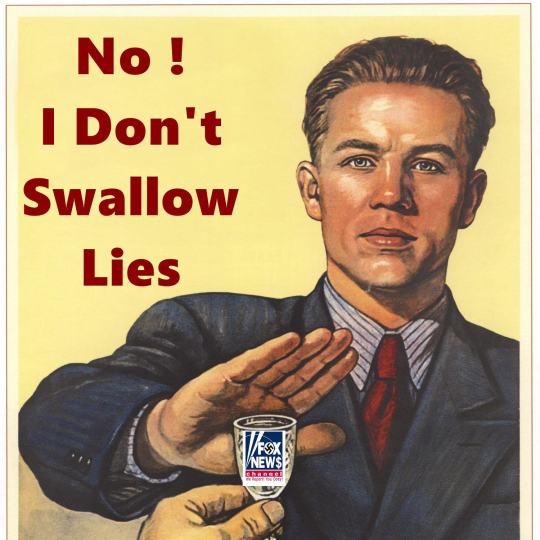
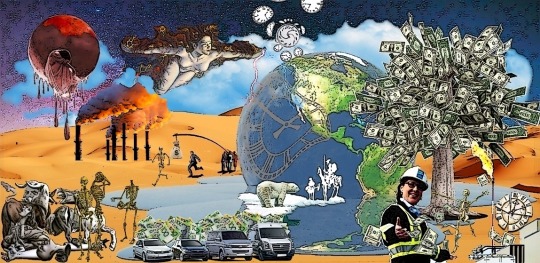
#one percent#plutocracy#fox news channel\#tucker carlson#fake news#corporate journalism#climate science#climate change#capitalism#green deal#corporate propaganda
8 notes
·
View notes
Text
The Plutonian Drug ~ Clark Ashton Smith
'It is remarkable.' said Dr. Manners, 'how the scope of our pharmacopoeia has been widened by interplanetary exploration. In the past thirty years, hundreds of hitherto unknown substances, employable as drugs or medical agents, have been found in the other worlds of our own system. It will be interesting to see what the Allan Farquar expedition will bring back from the planets of Alpha Centaurt when -- or if — it succeeds in reaching then and returning to earth. I doubt, though, if anything more valuable than selenine will be discovered. Selenine, derived from a fossil lichen found by the first rocket-expedition to the moon in 1975, has, as you know, practically wiped out the old-time curse of cancer. In solution, it forms the base of an infallible serum, equally useful for cure or prevention.'
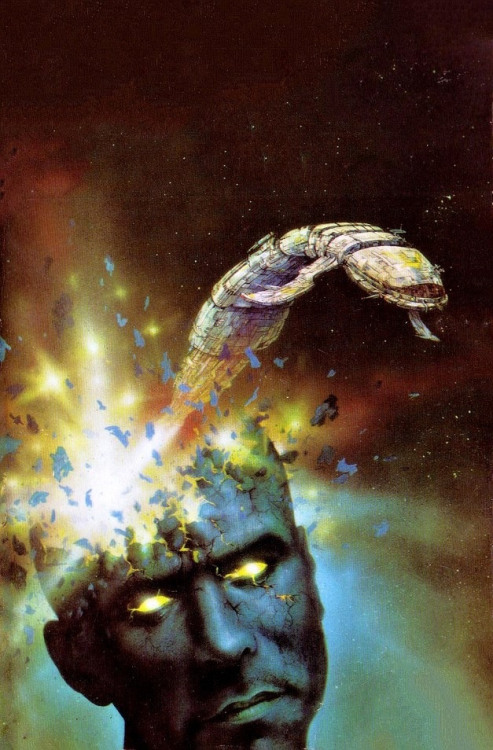
'I fear I haven't kept up on a lot of the new discoveries,' said Rupert Balcoth the sculptor, Manners' guest, a little apologetically. 'Of course, everyone has heard of selenine. And I've seen frequent mention, recently, of a mineral water from Ganymede whose effects are like those of the mythical Fountain of Youth.'
'You mean clithni, as the stuff is called by the Ganymedians. It is a clear, emerald liquid, rising in lofty geysers from the craters of quiescent volcanoes. Scientists believe that the drinking of clithni is the secret of the almost fabulous longevity of the Ganymedians; and they think that it may prove to be a similar elixir for humanity.'
'Some of the extraplametary drugs haven't been so beneficial to mankind, have they? ' queried Balcoth. 'I seem to have heard of a Martian poison that has greatly facilitated the gentle art of murder. And I am told that mnophka, the Venerian narcotic, is far worse, in its effects on the human system, than is any terrestrial alkaloid.'
'Naturally,' observed the doctor with philosophic calm, 'many of these new chemical agents are capable of due abuse. They share that liability with any number of our native drugs. Man, as ever; has the choice of good and evil... I suppose that the Martian poison you speak of is akpaloli, the juice of a common russet-yellow weed that grows in the oases of Mars. It is colorless, and without taste or odor. It kills almost instantly, leaving no trace, and imitating closely the symptoms of heart-disease. Undoubtedly many people have been made away with by means of a surreptitious drop of akpaloli in their food or medicine. But even akpaloli, if used in infinitesimal doses, is a very powerful stimulant, useful in cases of syncope, and serving, not infrequently to re-animate victims of paralysis in a quite miraculous manner.
'Of course,' he went on, 'there is an infinite lot still to be learned about many of these ultra-terrene substances. Their virtues have often been discovered quite by accident — and in some cases, the virtue is still to be discovered.
'For example, take mnophka, which you mentioned a little while ago. Though allied in a way, to the earthnarcotics, such as opium and hashish, it is of little use for anaesthetic or anodyne purposes. Its chief effects are an extraordinary acceleration of the time-sense, and a heightening and telescoping of all sensations, whether pleasurable or painful. The user seems to be living and moving at a furious whirlwind rate — even though he may in reality be lying quiescent on a couch. He exists in a headlong torrent of sense-impressions, and seems, in a few minutes, to undergo the experiences of years. The physical result is lamentable — a profound exhaustion, and an actual aging of the tissues, such as would ordinarily require the period of real time which the addict has "lived" through merely in his own illusion.
'There are some other drugs, comparatively little known, whose effects, if possible, are even more curious than those of mnophka. I don't suppose you have ever heard of plutonium?'
'No, I haven't,' admitted Balcoth. 'Tell me about it.'
'I can do even better than that — I can show you some of the stuff, though it isn't much to look at — merely a fine white powder.'
Dr. Manners rose from the pneumatic-cushioned chair in which he sat facing his guest, and went to a large cabinet of synthetic ebony, whose shelves were crowded with flasks, bottles, tubes, and cartons of various sizes and forms. Re turning, he handed to Balcoth a squat and tiny vial, twothirds filled with a starchy substance.
'Plutonium,' explained Manners, 'as its name would indicate, comes from forlom, frozen Pluto, which only one terrestrial expedition has so far visited — the expedition led by the Cornell brothers, John and Augustine, which started in 1990 and did not return to earth till 1996, when nearly everyone had given it up as lost. John, as you may have heard, died during the returning voyage, together with half the personnel of the expedition: and the others reached earth with only one reserve oxygen-tank remaining.
This vial contains about a tenth of the existing supply of plutonium. Augustine Cornell, who is an old schoolfriend of mine gave it to me three years ago, just before he embarked with the Allan Farquar crowd. I count myself pretty lucky to own anything so rare.
'The geologists of the party found the stuff when they began prying beneath the solidified gases that cover the surface of that dim, starlit planet, in an effort to learn a little about its composition and history. They couldn't do much under the circumstances, with limited time and equipment; but they made some curious discoveries — of which plutonium was far from being the least.
'Like selenine, the stuff is a bi-product of vegetable fossilization. Doubtless it is many billion years old, and dates back to the time when Pluto possessed enough internal heat to make possible the development of certain rudimentary plant-forms on its blind surface. It must have had an atmosphere then; though no evidence of former animal-life was found by the Cornells.
'Plutonium, in addition to carbon, hydrogen, nitrogen, and oxygen, contains minute quantities of several unclassified elements. It was discovered in a crystalloid condition, but turned immediately to the fine powder that you see, as soon as it was exposed to air in the rocketship. It is readily soluble in water, forming a permanent colloid, without the least sign of deposit, no matter how long it remains in suspension.'
'You say it is a drug?' queried Balcoth. 'What does it do to you?'
'I'll come to that in a minute — though the effect is pretty hard to describe. The properties of the stuff were discovered by chance: on the return journey from Pluto, a member of the expedition, half delirious with space-fever, got hold of the unmarked jar containing it and took a small dose, imagining that it was bromide of potassium. It served to complicate his delirium for a while — since it gave him some brand-new ideas about space and time.
'Other people have experimented with it since then. The effects are quite brief (the influence never lasts more than half an hour) and they vary considerably with the individual. There is no bad aftermath, either neural, mental, or physical, as far as anyone has been able to determine. I've taken it myself, once or twice, and can testify to that.
'Just what it does to one, I am not sure. Perhaps it merely produces a derangement or metamorphosis of sensations, like hashish; or perhaps it serves to stimulate some rudimentary organ, some dormant sense of the human brain. At any rate there is, as clearly as I can put it, an altering of the perception of time — of actual duration — into a sort of space-perception. One sees the past, and also the future, in relation to one's own physical self, like a landscape stretching away on either hand. You don't see very far, it is true -merely the events of a few hours in each direction; but it's a very curious experience; and it helps to give you a new slant on the mystery of time and space. It is altogether different from the delusions of mnophka.'
'It sounds very interesting,' admitted Balcoth. 'However, I've never tampered much with narcotics myself; though I did experiment once or twice, in my young, romantic days with cannabis Indica. I had been reading Gautiet and Baudelaire, I suppose. Anyway, the result was rather disappointing.'
'You didn't take it long enough for your system to absorb a residuum of the drug, I imagine,' said Manners. 'Thus the effects were negligible, from a visionary standpoint, But plutonium is altogether different — you get the maximum result from the very first dose. I think it would interest you greatly, Balcoth, since you are a sculptor by profession: you would see some unusual plastic images, not easy to render in terms of Euclidean planes and angles. I'd gladly give you a pinch of it now, if you'd care to experiment.'
'You're pretty generous, aren't you, since the stuff is so rare?'
'I'm not being generous at all. For years, I've planned to write a monograph on ultra-terrestrial narcotics; and you might give me some valuable data. With your type of brain and your highly developed artistic sense, the visions of plutonium should be uncommonly clear and significant. All I ask is, that you describe them to me as fully as you can afterwards.'
'Very well,' agreed Balcoth. 'I'll try anything once.' His curiosity was inveigled, his imagination seduced, by Manner's account of the remarkable drug.
Manners brought out an antique whisky-glass, which he filled nearly to the rim with some golden-red liquid. Uncorking the vial of plutonium, he added to this fluid a small pinch of the fine white powder, which dissolved immediately and without effervescence.
'The liquid is a wine made from a sweet Martian tuber known as ovvra,' he explained. 'It is light and harmless, and will counteract the bitter taste of the plutonium. Drink, it quickly and then lean back in your chair.'
Balcoth hesitated, eyeing the golden-red fluid.
'Are you quite sure the effects will wear off as promptly as you say?' he questioned. 'It's a quarter past nine now, and I'll have to leave about ten to keep an appointment with one of my patrons at the Belvedere Club. It's the billionaire, Claud Wishhaven. who wants me to do a bas-relief in pseudo-jade and neo-jasper for the hall of his country mansion. He wants something really advanced and futuristic. We're to talk it over tonight — decide on the motifs, etc.'
"That gives you forty-five minutes," assured the doctor -- 'and in thirty, at the most your brain and senses will be perfectly normal again. I've never known it to fail. You'll have fifteen minutes to spare, in which to tell me all about your sensations.'
Balcoth emptied the little antique glass at a gulp and leaned back, as Manners had directed, on the deep pneumatic cushions of the chair; He seemed to be falling easily but endlessly into a mist that had gathered in the room with unexplainable rapidity; and through this mist he was dimly aware that Manners had taken the empty glass from his relaxing fingers. He saw the face of Manners far above him, small and blurred, as if in some tremendous perspective of alpine distance; and the doctor's simple action seemed to be occurring in another world.
He continued to fall and float through eternal mist, in which all things were dissolved as in the primordial nebulae of chaos. After a timeless interval, the mist which had been uniformly gray and hueless at first, took on a flowing iridescence, never the same for two successive moments; and the sense of gentle falling turned to a giddy revolution, as if he were caught in an ever-accelerating vortex.
Coincidentally with his movement in this whirlpool of prismatic splendor, he seemed to undergo an indescribable mutation of the senses. The whirling colors, by subtle, ceaseless gradations, became recognizable as solid forms. Emerging, as if by an act of creation, from the infinite chaos, they appeared to take their place in an equally infinite vista. The feeling of movement, through decrescent spirals, was resolved into absolute immobility. Balcoth was no longer conscious of himself as a living organic body: he was an abstract eye, a discorporate center of visual awareness, stationed alone in space, and yet having an intimate relationship with the frozen prospect on which he peered from his ineffable vantage.
Without surprise, he found that he was gazing simultaneously in two directions. On either hand, for a vast distance that was wholly void of normal perspective, a weird and peculiar landscape stretched away, traversed by an unbroken frieze or bas-relief of human figures that ran like a straight undeviating wall.
For awhile, the frieze was incomprehensible to Balcoth, he could make nothing of its glacial, flowing outlines with their background of repeated masses and complicated angles and sections of other human friezes that approached or departed, often in a very abrupt manner, from an unseen world beyond. Then the vision seemed to resolve and clarify itself, and he began to understand.
The bas-relief, he saw, was composed entirely of a repetition of his own figure; plainly distinct as the separate waves of a stream, and possessing a stream-like unity. Immediately before him, and for some distance on either hand. the figure was seated in a chair — the chair itself being subject to the same billowy repetition. The background was composed of the reduplicated figure of Dr. Manners, in another chair; and behind this, the manifold images of a medicine cabinet and a section of wall-paneling.
Following the vista on what, for lack of any better name, might be termed the left hand, Balcoth saw himself in the act of draining the antique glass, with Manners standing before him. Then, still further, he saw himself previous to this, with a background in which Manners was presenting him the glass, was preparing the dose of plutonium, was going to the cabinet for the vial, was rising from his pneumatic chair. Every movement, every attitude of the doctor and himself during their past conversation, was visioned in a sort of reverse order, reaching away, unalterable as a wall of stone sculpture, into the weird, eternal landscape. There was no break in the continuity of his own figure; but Manners seemed to disappear at times, as if into a fourth dimension. These times, he remembered later, were the occasions whem the doctor had not been in his line of vision. The perception was wholly visual; and though Balcoth saw his own lips and those of Manner's parted in movements of speech, he could hear no word or other sound.
Perhaps the most singular feature of the vision was the utter absence of foreshortening. Though Balcoth seemed to behold it all from a fixed, immovable point, the landscape and the intersecting frieze presented themselves to him without diminution, maintaining a frontal fullness and distinctness to a distance that might have been many miles.
Continuing along the left-hand vista, he saw himself entering Manners' apartments, and then encountered his image standing in the elevator that had borne him to the ninth floor of the hundred story hotel in which Manners lived. Then the frieze appeared to have an open street for background, with a confused, ever-changing multitude of other faces and forms, of vehicles and sections of buildings, all jumbled together as in some old-time futuristic painting. Some of these details were full and clear, and others were cryptically broken,and blurred, so as to be scarcely recognizable. Everything, whatever its spatial position and relation, was re-arranged in the flowing frozen stream of this temporal pattern.
Balcoth retraced the three blocks from Manners' hotel to his own studio, seeing all his past movements, whatever their direction in tri-dimensional space, as a straight line in the time-dimemion. At last he was in his studio; and there the frieze of his own figure receded into the eerie prospect of space-transmuted time among other friezes formed of actual sculptures. He beheld himself giving the final touches with his chisel to a symbolic statue at the afternoon's end, with a glare of ruddy sunset falling through an unseen window and flushing the pallid marble. Beyond this there was a reverse fading of the glow, a thickening and blurring of the half-chiselled features of the image, a female form to which he had given the tentative name of Oblivion. At length, among half-seen statuary, the left-hand vista became indistinct, and melted slowly in amorphous mist. He had seen his own life as a continuous glaciated stream, stretching for about five hours into the past.
Reaching away on the right hand, he saw the vista of the future. Here there was a continuation of his seated figure under the influence of the drug, opposite the continued bas relief of Dr. Manners and the repeated cabinet and wall panels. After a considerable interval, he beheld himself in the act of rising from the chair. Standing erect, he seemed to be talking awhile, as in some silent antique film, to the listening doctor. After that, he was shaking hands with Manners, was leaving the apartment, was descending in the lift and following the open brightly-lighted street toward the Belvedere Club where he was to keep his appointment with Claud Wishhaven.
The Club was only three blocks away, on another street; and the shortest route, after the first block, was along a narrow alley between an office building and a warehouse. Balcoth had meant to take this alley; and in his vision, he saw the bas-relief of his future figure passing along the straight pavement with a background of deserted doorways and dim walls that towered from sight against the extinguished stars.
He seemed to be alone: there were no passers — only the silent, glimmering endlessly repeated angles of arc-lit walls and windows that accompanied his repeated figure. He saw himself following the alley, like a stream in some profound canyon; and there midway, the strange vision came to an abrupt inexplicable end, without the gradual blurring into formless mist, that had marked his retrospective view of the past.
The sculpture-like frieze with its architectural ground appeared to terminate, broken off clean and sharp, in a gulf of immeasurable blackness and nullity. The last wave-like duplication of his own person, the vague doorway beyond it, the glimmering alley-pavement, all were seen as if shorn asunder by a falling sword of darkness, leaving a vertical line of cleavage beyond which there was — nothing.
Balcoth had a feeling of utter detachment from himself, an eloignment from the stream of time, from the shores of space, in some abstract dimension. The experience, in its full realization, might have lasted for an instant only — or for eternity. Without wonder, without curiosity or reflection, like a fourth-dimensional Eye, he viewed simultaneously the unequal cross-sections of his own past and future.
After that timeless interval of complete perception, there began a reverse process of change. He, the all-seeing eye, aloof in super-space, was aware of movement, as if he were drawn back by some subtle thread of magnetism into the dungeon of time and space from which he had momentarily departed. He seemed to be following the frieze of his own seated body toward the right, with a dimly felt rhythm or pulsation in his movement that corresponded to the merging duplications of the figure. With curious clearness, he realized that the time-unit, by which these duplications were determined, was the beating of his own heart.
Now with accelerative swiftness, the vision of petrific form and space was re-dissolving into a spiral swirl of multitudinous colors, through which he was drawn upward. Presently he came to himself, seated in the pneumatic chair, with Dr. Manners opposite. The room seemed to waver a little, as if with some lingering touch of the weird transmutation; and webs of spinning iris hung in the corners of his eyes. Apart from this, the effect of the drug had wholly vanished, leaving, however, a singularly clear and vivid memory of the almost ineffable experience.
Dr. Manners began to question him at once, and Balcoth described his visionary sensations as fully and graphically as he could.
'There is one thing I don't understand,' said Manners at the end with a puzzled frown. 'According to your account, you must have seen five or six hours of the past, running in a straight spatial line, as a sort of continuous landscape; but the vista of the future ended sharply after you had followed it for three-quarters of an hour; or less. I've never known the drug to act so unequally: the past and future perspectives have always been about the same in their extent for others who have used plutoninum.'
'Well,' observed Balcoth, 'the reaI marvel is that I could see into the future at all. In a way, I can understand the vision of the past. It was clearly composed of physical memories — of all my recent movements; and the background was formed of all the impressions my optic nerves had received during that time. But how could I behold something that hasn't yet happened?'
'There's the mystery, of course,' assented Manners. 'I can think of only one explanation at all intelligible to our finite minds. This is, that all the events which compose the stream of time have already happened, are happening, and will continue to happen forever. In our ordinary state of consciousness, we perceive with the physical senses merely that moment which we call the present. Under the influence of plutonium, you were able to extend the moment of present cognition in both directions, and to behold simultaneously a portion of that which is normally beyond perception. Thus appeared the vision of yourself as a continuous, immobile body, extending through the time-vista.'
Balcoth, who had been standing, now took his leave. 'I must be going,' he said, 'or I'll be late for my appointment.'
'I won't detain you any longer,' said Manners. He appeared to hesitate, and then added: 'I'm still at a loss to comprehend the abrupt cleavage and termination of your prospect of the future. The alley in which it seemed to end was Falman Alley, I suppose — your shortest route to the Belvedere Club. If I were you, Balcoth, I'd take another route, even if it requires a few minutes extra.'
'That sounds rather sinister,' laughed Balcoth. 'Do you think that something may happen to me in Falman Alley?'
'I hope not — but I can't guarantee that it won't.' Manners' tone was oddly dry and severe. 'You'd better do as I suggest.'
Balcoth felt the touch of a momentary shadow as he left the hotel — a premonition brief and light as the passing of some night-bird on noiseless wings. What could it mean -that gulf of infinite blackness into which the weird frieze of his future had appeared to plunge, like a frozen cataract? Was there a menace of some sort that awaited him in a particular place, at a particular moment?
He had a curious feeling of repetition, of doing something that he had done before, as he followed the street. Reaching the entrance of Falman Alley, he took out his watch. By walking briskly and following the alley, he would reach the Belvedere Club punctually. But if he went on around the next block, he would be a little late. Balcoth knew that his prospective patron, Claud Wishhaven, was almost a martinet in demanding punctuality from himself and from others. So he took the alley.
The place appeared to be entirely deserted, as in his vision. Midway, Balcoth approached the half-seen door — a rear entrance of the huge warehouse — which had formed the termination of the time prospect. The door was his last visual impression, for something descended on his head at that moment, and his consciousness was blotted out by the supervening night he had previsioned He had been sand- bagged, very quietly and efficiently, by a twenty-first century thug. The blow was fatal; and time, as far as Balcoth was concerned, had come to an end.
2 notes
·
View notes
Text
'My heart was breaking': Maritimers with Afghan connections worried about women and girls
More than an ocean away from the country of her birth, the president of the Afghan Society of Halifax stays connected as best she can, often through shared videos and information on social media sites.
Gulmakai M. Sarvar is still astonished at the breathtaking speed the Taliban took over the country after the U.S. pulled out, a decision that still baffles her.
"They did fight over 20 years with the Taliban, and then left over? It is unbelievable."
Unbelievable, too, are the images emerging from that country, although there was relative-calm at the airport in Kabul on Tuesday.
Still, scores of desperate people continue to flock there, hoping to get out, despite Taliban assurances of an "amnesty" across Afghanistan.
The United Nations is skeptical.
"It's very early now, it's very fluid. It's very hard to say what is happening exactly," said Rupert Colville, a spokesperson for the U.N. High Commissioner for Human Rights from Geneva
Celebrated Pakistani Activist and Nobel Prize laureate Malala Yousafzai was more blunt.
"I am deeply concerned about the situation in Afghanistan right now, especially for the safety of women and girls there," she said.
Tens of millions of others clearly agree, with the hashtag #AfghanWomen trending on Twitter and other sites.
Older generations remember the Taliban's ultra-conservative Islamic views, which included severe restrictions on women as well as stonings, amputations and public executions.
Stories are already circulating that not much has changed, with the group reportedly collecting information about younger females.
"Each fighter apparently deserves four wives," said Halifax entrepreneur and human rights activist Barb Stegemann from her home in Bedford.
Intimately connected to the country since her best friend survived a horrific attack, Stegemann has been buying essential oils from Afghanistan for years for her fragrance brand, The 7 Virtues.
With the U.S. gone, she says the world has to step up to protect the vulnerable.
"So, the core of the solution, is the international leadership getting very serious about not accepting corruption - and I'm really not seeing that," she said.
Frustration, too, at theAfghan Society of Halifax,where nearly all news from home these days is bad.
"I saw the videos on social media -- my heart was breaking," said Gulmakai.
from CTV News - Atlantic https://ift.tt/2W1lbIT
0 notes